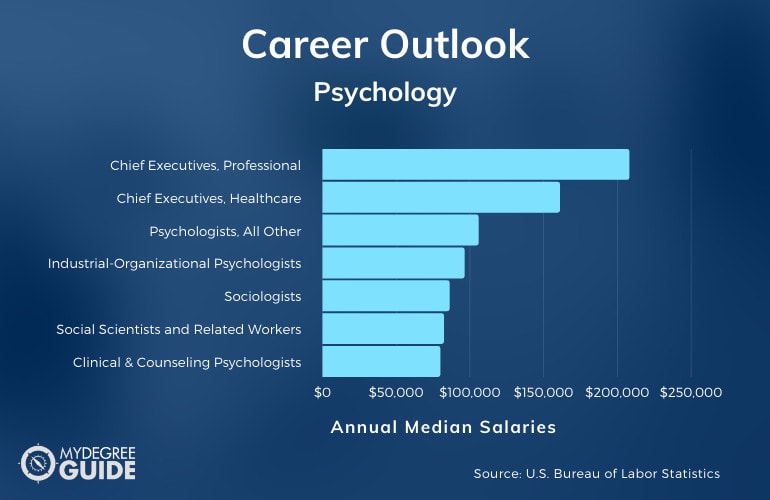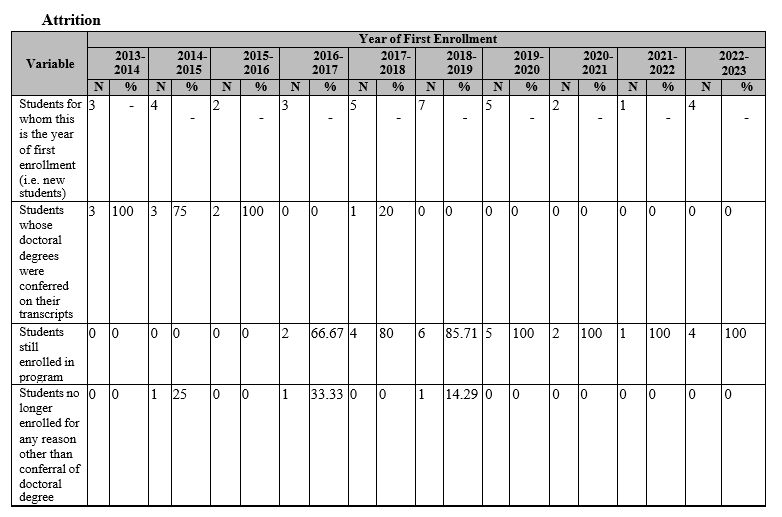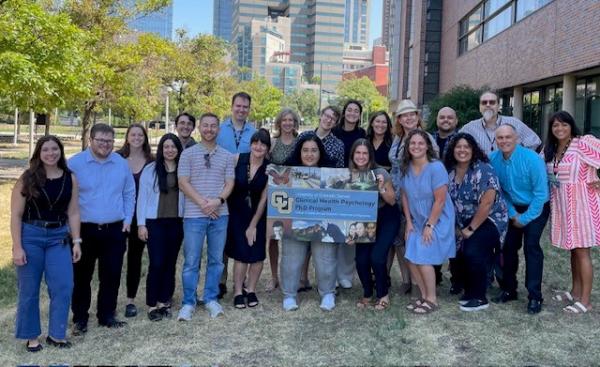

2024 Best Dual Masters and PhD Programs in Psychology Online
If you’re wanting to pursue advanced education in the field of psychology, then you may be interested in dual masters and PhD programs in psychology online.

This option can help you develop a comprehensive and in-depth understanding of various elements of psychology, from theory and research to clinical practice.
Editorial Listing ShortCode:
Dual masters and PhD programs online can enable you to advance your education and transition from bachelor-level studies to the highest degree available in the field.
Universities Offering Masters and PhD in Psychology Dual or Combined Degree Programs
Methodology: The following school list is in alphabetical order. To be included, a college or university must be regionally accredited and offer degree programs online, on campus or in a hybrid format.
DePaul University
DePaul University offers a dual degree program in psychological sciences that allows students to pursue a Master of Arts and a PhD in Psychology. The program can be completed online or in-person. To graduate, students must complete 19 courses, a thesis, and a dissertation. Applicants must have a GPA of 3.5 or higher and need to submit GRE scores, letters of recommendation, and a personal statement.
DePaul University is accredited by The Higher Learning Commission.
Georgetown University
Georgetown University offers a dual degree program for students interested in receiving a Master’s in Public Policy and a PhD in Psychology. Students must complete 51 credits and a thesis to graduate. The program can only be completed on campus. Applicants must fill out an online application with a resume and 3 letters of recommendation. Georgetown University is accredited by the Middle States Commission on Higher Education.
Georgia State University
Georgia State University offers an on-campus dual degree option for students in the Community Psychology Program. Students may obtain both a PhD in Psychology and a Master of Public Health within 6 years. A 3 semester practicum is required to graduate. Applicants must submit a statement of purpose and 3 letters of recommendation.
Georgia State University is accredited by the Southern Association of Colleges and Schools Commission on Colleges.
Nova Southeastern University
Nova Southeastern University offers an on-campus dual degree program for those interested in obtaining both a Master of Business Administration and a PhD in Psychology. Applicants must be in their second year of their PhD and must contact the Director of Academic Affairs to join the program.
NSU is accredited by the Southern Association of Colleges and Schools Commission on Colleges.
Pacifica Graduate Institute
Pacifica Graduate Institute offers a dual degree for a Master of Arts and a PhD in Psychology. The program can typically be completed in 3 years and requires the completion of an exam portfolio, a dissertation, and an internship. Applicants must submit a personal statement, a resume, and 3 letters of recommendation.
Pacifica Graduate Institute is accredited by the Western Association of Schools and Colleges.
Portland State University
Portland State University offers a dual degree program for a Master and Doctorate in Psychology. Both programs must be completed on campus. Students may choose to add one of 5 concentrations to their degree as well. Applicants must submit a portfolio, a personal essay, letters of recommendation, and GRE scores.
Portland State University is accredited by the Northwest Commission on Colleges and Universities.
Rutgers University
Rutgers University offers a PhD and a Master of Science in Psychology. Students must choose one of these focus areas to study: Behavioral and System Neuroscience, Clinical Psychology, Cognitive Psychology, or Social Psychology. Applicants must submit GRE scores, a personal statement, and 3 letters of recommendation.
Rutgers is accredited by the Middle States Commission on Higher Education.
Saint Louis University
Saint Louis University offers a dual degree program for students interested in receiving a Master of Science in Public Health and a PhD in Psychology. Students must complete 126 credits to graduate and maintain a GPA of 3.0 or higher. Applicants must be admitted into both programs to pursue a dual degree.
Saint Louis University is accredited by the Higher Learning Commission of the North Central Association of Colleges and Schools.
University of Missouri
The University of Missouri offers a dual degree program for students interested in receiving a Master of Arts and a Doctorate in Psychology. Students must complete 113 credit hours, a dissertation, and a thesis to graduate. Applicants will be judged based on their GPA and GRE scores.
The University of Missouri is accredited by the Higher Learning Commission.
University of New Mexico
The University of New Mexico offers a Master of Arts and a PhD in Educational Psychology. The program can typically be completed in 5 years, and students must write a master’s thesis and a comprehensive paper to graduate. To be eligible for the program, applicants need to write their intention for the dual degree program in their letter of intent and must have a GPA of 3.0 or higher.
The University of New Mexico is accredited by the Higher Learning Commission.
University of Rochester
The University of Rochester offers an MA to PhD track for students interested in obtaining both degrees in psychology. Students may choose between 3 different areas of psychology: Clinical Psychology, Developmental Psychology, and Social-Personality Psychology. Applicants must submit a personal statement, 3 letters of recommendation, and a resume.
The University of Rochester is an accredited by the Middle States Commission on Higher Education.
University of South Florida
The University of South Florida offers a PhD in Psychology that allows students to pursue a Master of Arts as they study. Students may choose a concentration in Clinical Psychology, Industrial-Organizational Psychology, or Cognition, Neuroscience, and Social Psychology. Applicants must submit transcripts, a statement of purpose, and 3 letters of recommendation. The University of South Florida is accredited by the Southern Association of Colleges and Schools Commission on Colleges.
University of Southern California
The University of Southern California offers a dual degree program for a Master of Public Health and a PhD in Psychology. Those interested in the program must first apply to the PhD in Clinical Science before applying for the dual degree program in their first year.
The University of Southern California is accredited by the Western Association of Schools and Colleges, the Senior College and University Commission.
University of Texas – Rio Grande Valley
The University of Texas—Rio Grande Valley offers a PhD in Clinical Psychology program that allows students to pursue a Master of Science in Psychology as well. Students must complete 96 credit hours, including a 12 month internship. Applicants must have a bachelor’s degree with a GPA of 3.0 or higher, GRE scores, and 3 letters of recommendation.
UTRGV is accredited by the Southern Association of Colleges and Schools Commission on Colleges.
Dual Masters and PhD Programs in Psychology Online

There are a variety of educational programs that offer a masters in psychology as a combined degree with a Ph.D. in Psychology.
The specific degree combination that works best for you may depend on your educational and career goals, such as whether you’re interested in sports psychology or clinical psychology.
Some dual masters and doctoral degree combinations can include:
- MS in Clinical Psychology with a Doctor of Psychology (PsyD)
- MA in Sports Psychology with a PsyD in Clinical Psychology
- MA in Psychology with a PsyD in Clinical Psychology
There are also programs that offer advanced education in psychology coupled with another academic area. For example, some programs pair a PhD in Psychology with a masters in business administration, a masters in criminal justice, or a masters in education. Others, such as MPH / MSW dual degree programs , let you earn two masters degrees at the same time.
Specific offerings can vary greatly depending on the school you choose to attend.
Enrolling in a dual masters and PhD program in psychology online may offer you a number of benefits:
- Less time . With a dual program, you can earn your masters and PhD in less time than if you were to complete each program separately.
- Less cost . Graduate degrees tend to cost more if you complete each program separately.
- Simpler application process . You only need to apply to a single program, reducing the burden of needing to apply to each program independently.
- More career opportunities . Holding two graduate-level degrees may help broaden professional opportunities in the job market.
A dual masters and PhD program will include a variety of masters-level courses in addition to PhD-level educational options. This can allow you to develop comprehensive, in-depth knowledge in this area of study.
It may also be worth exploring the combined masters and PsyD programs that some universities offer.
Psychology Careers

Psychology graduate programs can help prepare you to work in a number of different industries and sectors of the economy. These may include government institutions, academia, research, hospitals and healthcare centers, and family and youth services.
Other areas where your skills and expertise may be needed include sports management, criminal justice, education, or community-based and nonprofit services.
According to the Bureau of Labor Statistics , earning a dual master’s and PhD in Psychology online can help you qualify for a variety of roles in the field.
Attending dual masters and doctorate degree programs online may allow you to take advantage of the positive job growth that the Bureau of Labor Statistics predicts for a number of positions in the field of psychology.
These positions include psychologists (3% job growth), top executives (4%), sociologists (4%), social scientists and related workers (4%), and postsecondary teachers (9%).
Psychology Combined Master’s and PhD Curriculum

Completing a combined masters and PhD program in psychology can require you to take courses at a masters level followed by others at a doctoral level.
- Psychological Statistics : This course is a review of key statistical methods used in the field of psychology.
- Introduction to Group Psychology : You’ll look at theories related to group psychology, including group dynamics, defense mechanisms, and systems theory.
- Human Growth and Development : This course is an examination of the various stages of human development, from childhood and adolescence through to adulthood.
- Developmental Psychopathy and Treatment : You’ll analyze different behavior disorders through different stages of development, including assessment practices, DSM-IV diagnoses, and intervention methods.
- Vocational and Organizational Psychology : You’ll look at various components of career and workplace psychology, including making career decisions and career counseling practices.
- Marriage and Family Psychology : This course is an examination of psychological theories related to marriage and family counseling.
- Biological Bases for Behavior : This course analyzes the relationship between physiological and psychological functioning in humans.
- Ethical Issues in Psychology : This course is a review of ethical issues and standards for professional practice in the field of psychology.
- Approaches to Psychotherapy : You’ll look at theories, practical applications, and techniques in relation to the treatment approach of psychotherapy.
- Diversity Issues in Counseling Psychology : This course is an examination of counseling approaches and skills that account for multicultural differences and cultural diversity in practice.
In addition to completing coursework, many dual master’s and PhD programs require you to complete internships and doctorate projects in the field of psychology.
How to Become a Psychologist

There are a number of steps involved in becoming a licensed psychologist, and the requirements to become licensed may vary from one state to the next.
In order to become a licensed psychologist, you’re often required to:
- Complete the required level of education . Many states require that you hold a PhD in Psychology or a PsyD. To qualify for a doctoral program, you may first need to earn a bachelor’s degree from an accredited institution. In some cases, you may choose to complete a master’s program prior to engaging in PhD-level education.
- Earn a specified number of clinical work hours . Before becoming eligible to earn a license to practice, you’re often required to perform a designated number of supervised clinical work hours. The specific number of hours may vary by state.
- Pass a professional exam . Finally, in order to become a licensed psychologist, you’re required to complete and pass the Examination for Professional Practice in Psychology (EPPP).
- Obtain license . Once you complete your state’s licensing requirements, you can be granted your license to practice.
You may also be required to hold a terminal degree from a program that has been accredited by the American Psychological Association (APA).
Dual Masters and PhD Admissions Requirements

Schools and programs often differ in their specific requirements for admissions when it comes to dual masters and PhD programs, but some common criteria include:
- Bachelor’s degree from an accredited institution
- Submission of all postsecondary transcripts
- Letters of recommendation from academic or work supervisors
- Copy of your resume or CV
- Statement of purpose outlining your interest in the program and school
While it is becoming a less common requirement, some schools may also require you to submit GRE or GMAT scores as part of your application.
Accreditation

Regional accreditation is a status that indicates a school’s educational offerings have met a predetermined set of quality standards.
By attending a program that has been regionally accredited, you may have an easier time transferring credits from one school to the next. A degree from a regionally accredited institution may also be regarded more highly by potential employers.
For more information on the accreditation status of programs you’re interested in attending, you can visit the US Department of Education ’s website.
American Psychological Association (APA) Accreditation

Psychology programs can also have programmatic accreditation. The top accrediting agency for psychology programs is the American Psychological Association (APA) .
Programs that have been granted programmatic accreditation by the APA have met standards that confirm the overall quality of their academic offerings. Achieving these quality standards indicates that the program meets professional best practices in the field of psychology and is in line with evidence-based approaches.
In some states, attending an APA accredited program is required in order to become a licensed psychologist.
Financial Aid and Scholarships

When pursuing a dual masters and PhD program in psychology, you may be eligible to apply for financial aid to help you fund your educational goals. Financial aid options include:
- Government aid . Federal and state financial aid often comes in the form of grants and loans.
- Scholarships . Scholarships can be offered by private organizations, public organizations, and sometimes the school you’re interested in attending.
- Financial aid packages from your school . Financial aid from your school can include loans, scholarships, tuition reimbursements, or stipends to help cover costs.
For more information on financial aid options that may be available to you, you can visit the US Department of Education ’s website.
Can I Get a PhD in Psychology Without a Masters?

Yes, many PhD in Psychology programs don’t require a master’s degree for enrollment. Most psychology doctoral programs only require students to hold a bachelor’s degree, but specific admissions criteria can vary from one school to the next.
Dual masters and PhD programs allow you to earn the two degrees within the same program, which may cut down on the cost and time required to earn both degrees. There are also some PhD programs that do not require you to have a masters degree to enroll and do not even require you to earn a master’s in order to graduate with your PhD.
What’s the Difference Between a Masters vs. PhD in Psychology?
A master’s in psychology and a PhD in Psychology are both graduate-level academic programs, but they are not the same.
A PhD-level education is more in-depth and advanced than a masters.
Can I Get My Masters and PhD in Psychology at the Same Time?

There are a number of dual degree programs available that may allow you to earn a masters degree and a PhD in Psychology at the same time. In combined masters and PhD programs, you’ll typically complete a blend of masters-level and doctorate-level courses in order to achieve the requirements for each degree.
Depending on the dual degree program you choose to attend, you may be able to save on the total cost of your education. You may also be able to complete both degrees in less time than the traditional route.
How Long Does It Take to Get a Combined Masters and PhD Program in Psychology?
Combined masters and PhD programs in psychology typically take 5 to 6 years to complete, depending on the university and your chosen specialty.
How long it takes to complete a combined master’s and PhD program can also depend on whether you attend on a full-time or part-time basis. Whether you’re required to complete an internship, dissertation, or thesis as part of your studies can also impact the total length of time required to earn your degrees.
Should I Enroll in a Dual Master’s and PhD Program in Psychology?

Whether a dual masters and PhD program is the right path for you depends on your educational background as well as your future career and academic goals.
Attending a dual degree program may be a good fit for you if:
- You hold a bachelors degree from an accredited university.
- You’re interested in earning both a masters degree and a doctorate.
- You want to earn your graduate degrees in less time than traditional routes.
A dual degree program may help you develop the skills and knowledge required to advance into your chosen career path in less time and at less cost than alternative options.
What’s the Difference Between a PsyD vs. PhD in Psychology?

While both PsyD and PhD programs are concentrated on the field of psychology at an advanced level, there are some key distinctions to be aware of when deciding which educational path to pursue.
- PsyD : A Doctor of Psychology (PsyD) is a professional doctorate, placing greater emphasis on clinical work in the field of psychology
- PhD : A Doctor of Philosophy (PhD) in Psychology places greater emphasis on research than clinical work in the field of psychology.
The option that is best for you will depend on your career and educational goals.
Is a Dual Masters and PhD in Psychology Worth It?

Yes, a dual masters and PhD in Psychology is worth it for many students. Common careers in this field include clinical psychologist, social scientist, industrial organizational psychologist, postsecondary teacher, survey researcher, or sociologist.
According to the Bureau of Labor Statistics, a number of positions in the field are predicted to experience growth over the next several years. These positions include psychologists (3% job growth), top executives (4%), sociologists (4%), social scientists and related workers (4%), and postsecondary teachers (9%).
Getting Your Dual Masters and PhD Program in Psychology Online

If you’re interested in a career in psychology that requires graduate-level education, then pursuing a dual masters and PhD degree program in psychology online may be a strategic path for you to consider.
By pursuing a dual or combined degree program, you may be able to complete your education in less time and at a lower cost. This efficient degree path might help you get started in the professional world faster than average.
If you’re eager to enter the lucrative field of psychology, you can start your advanced educational journey today by exploring dual online psychology PhD and masters programs from accredited universities.

Psychology Graduate Programs in America
1-25 of 463 results
Stanford University Department of Humanities and Sciences
Stanford, CA •
Stanford University •
Graduate School
Stanford University ,
Graduate School ,
STANFORD, CA ,
Harvard Graduate School of Arts and Sciences
Cambridge, MA •
Harvard University •
- • Rating 4.56 out of 5 9 reviews
Other: I am Harvard Extension School student pursuing a master degree, ALM, in sustainability. I have achieved a 3.89 in this program so far and have qualified, applied, and accepted as a 'Special Student' in the Harvard Graduate School of Arts and Sciences. Through this School, I will be focusing my time at the John A. Paulson school of Engineering & Applied Sciences. Looking forward to wrapping up my final year on campus! ... Read 9 reviews
Harvard University ,
CAMBRIDGE, MA ,
9 Niche users give it an average review of 4.6 stars.
Featured Review: Other says I am Harvard Extension School student pursuing a master degree, ALM, in sustainability. I have achieved a 3.89 in this program so far and have qualified, applied, and accepted as a 'Special Student'... .
Read 9 reviews.
The Graduate School at Duke
Durham, NC •
Duke University •
- • Rating 4.8 out of 5 5 reviews
Current Master's student: The program is the best in the nation. It is the origin of the profession and it has helped developed it to what it is today. They seem to ver much involve alumni and are involved in your future. ... Read 5 reviews
Duke University ,
DURHAM, NC ,
5 Niche users give it an average review of 4.8 stars.
Featured Review: Current Master's student says The program is the best in the nation. It is the origin of the profession and it has helped developed it to what it is today. They seem to ver much involve alumni and are involved in your future. .
Read 5 reviews.
Valparaiso University
Graduate School •
VALPARAISO, IN
- • Rating 4.7 out of 5 10
College of Human Sciences and Humanities - University of Houston - Clear Lake
University of Houston - Clear Lake •
HOUSTON, TX
- • Rating 1 out of 5 1
Russell Sage College
- • Rating 4.26 out of 5 23
School of Arts & Sciences - University of Pennsylvania
Philadelphia, PA •
University of Pennsylvania •
University of Pennsylvania ,
PHILADELPHIA, PA ,
Rice School of Social Sciences
Houston, TX •
Rice University •
Blue checkmark.
Rice University ,
HOUSTON, TX ,
Weinberg College of Arts and Sciences
Evanston, IL •
Northwestern University •
Northwestern University ,
EVANSTON, IL ,
- Find college scholarships
College of Arts and Science
Nashville, TN •
Vanderbilt University •
Vanderbilt University ,
NASHVILLE, TN ,
Guarini School of Graduate and Advanced Studies
Hanover, NH •
Dartmouth College •
- • Rating 5 out of 5 1 review
Alum: I had a beautiful life-changing experience at the grand Guarini School of Graduate and Advanced Studies. The Guarini graduate program MALS created so many beautiful opportunities in interdisciplinary learning. Guarini is well integrated within the College, which provides a unique world-class learning experience. Guarini went beyond my expectations and made this experience the best I had and will ever have in my life. The only thing I would like changed is having a GRAD diploma in Latin instead of English to keep up with College tradition. ... Read 1 review
Dartmouth College ,
HANOVER, NH ,
1 Niche users give it an average review of 5 stars.
Featured Review: Alum says I had a beautiful life-changing experience at the grand Guarini School of Graduate and Advanced Studies. The Guarini graduate program MALS created so many beautiful opportunities in interdisciplinary... .
Read 1 reviews.
College of Arts and Letters - University of Notre Dame
Notre Dame, IN •
University of Notre Dame •
- • Rating 4.5 out of 5 2 reviews
Doctoral Student: The faculty at Notre Dame is excellent. The student to professor ratio makes for a wonderful one to one interaction between students and teachers. At Notre Dame, my interests, dreams, goals, research and career path matter. I loved this most. I feel taken seriously and supported with every possible resources for my mental, academic and career success. One gets many opportunities to grow talents through research, and presentations with helpful and supportive feedback from students and professors. For these reasons, I find it a place to be! On the down side, the weather is at first always a challenge for one who is not used to the harsh and gloomy midwestern winter. ... Read 2 reviews
University of Notre Dame ,
NOTRE DAME, IN ,
2 Niche users give it an average review of 4.5 stars.
Featured Review: Doctoral Student says The faculty at Notre Dame is excellent. The student to professor ratio makes for a wonderful one to one interaction between students and teachers. At Notre Dame, my interests, dreams, goals, research... On the down side, the weather is at first always a challenge for one who is not used to the harsh and gloomy midwestern winter. .
Read 2 reviews.
Dornsife College of Letters, Arts and Sciences
Los Angeles, CA •
University of Southern California •
University of Southern California ,
LOS ANGELES, CA ,
Cornell University College of Arts & Sciences
Ithaca, NY •
Cornell University •
Cornell University ,
ITHACA, NY ,
Rackham School of Graduate Studies
Ann Arbor, MI •
University of Michigan - Ann Arbor •
- • Rating 5 out of 5 3 reviews
Master's Student: I was nervous about attending a prestigious school like The University of Michigan but once classes started I realized that I had made the right decision. Tuition is very expensive but I love my professors and I believe that I am getting the best education in the country! ... Read 3 reviews
University of Michigan - Ann Arbor ,
ANN ARBOR, MI ,
3 Niche users give it an average review of 5 stars.
Featured Review: Master's Student says I was nervous about attending a prestigious school like The University of Michigan but once classes started I realized that I had made the right decision. Tuition is very expensive but I love my... .
Read 3 reviews.
- Sponsored Find Student Loan Options
- Law Schools
- Public Administration Graduate Programs
Graduate School of Arts & Sciences - Georgetown University
Nw Washington, DC •
Georgetown University •
- • Rating 5 out of 5 2 reviews
Master's Student: The program is highly practical. The professors explain concepts in class and give us home works to submit on each topic discussed on a weekly basis. This enables us to grasp the concepts more. We are informed of the professors office time and so we can email them to make inquiries and get assistance when needed. We make presentations during class which train us to become more bold and be able to communicate the concepts easily. We are able to discuss and critic writings independently. We work on projects in groups of about 3-4 and discuss findings to the entire class and professor. We review research papers and make meta-analyses inform of class projects. The program is well structured and i am gaining skills. My worst experience is having to worry about Tuition and other related school bills. ... Read 2 reviews
Georgetown University ,
NW WASHINGTON, DC ,
2 Niche users give it an average review of 5 stars.
Featured Review: Master's Student says The program is highly practical. The professors explain concepts in class and give us home works to submit on each topic discussed on a weekly basis. This enables us to grasp the concepts more. We... .
UCLA College of Letters and Science
University of California - Los Angeles •
- • Rating 3 out of 5 1 review
University of California - Los Angeles ,
1 Niche users give it an average review of 3 stars.
Krieger School of Arts & Sciences
Baltimore, MD •
Johns Hopkins University •
- • Rating 4.53 out of 5 19 reviews
Master's Student: I have yet to enroll for Fall 2023 after receiving my acceptance letter due to a delay in my need-based financial aid from JHU. However the Homewood Campus in Baltimore is beautiful and my Student Advisor, Alexis has been extremely helpful in initiating my enrollment process and answering all of my questions in a timely matter. My intended Advanced Academic Program is the accelerated (2 semester), dual-modality, 40-credit M.S. in Biotechnology, Biodefense concentration. All of the anticipated course subjects are diverse and there's even a customizable core lab course on campus (at least until Summer 2024). I can't wait and I wish you all the best in your search for academic programs or professional certifications. ... Read 19 reviews
Johns Hopkins University ,
BALTIMORE, MD ,
19 Niche users give it an average review of 4.5 stars.
Featured Review: Master's Student says I have yet to enroll for Fall 2023 after receiving my acceptance letter due to a delay in my need-based financial aid from JHU. However the Homewood Campus in Baltimore is beautiful and my Student... .
Read 19 reviews.
Dietrich College of Humanities & Social Sciences
Pittsburgh, PA •
Carnegie Mellon University •
Carnegie Mellon University ,
PITTSBURGH, PA ,
The Graduate School of Arts & Sciences - University of Virginia
Charlottesville, VA •
University of Virginia •
- • Rating 4 out of 5 1 review
Alum: Very good in some areas, excellent in other areas, many academic choices available in all areas of study ... Read 1 review
University of Virginia ,
CHARLOTTESVILLE, VA ,
1 Niche users give it an average review of 4 stars.
Featured Review: Alum says Very good in some areas, excellent in other areas, many academic choices available in all areas of study .
Laney Graduate School
Atlanta, GA •
Emory University •
Master's Student: I chose the graduate programs at Emory because they are ranked among the best in the country. The school of nursing also provides the clinical experiences, something many of the online only nurse practitioner programs do not do. ... Read 2 reviews
Emory University ,
ATLANTA, GA ,
Featured Review: Master's Student says I chose the graduate programs at Emory because they are ranked among the best in the country. The school of nursing also provides the clinical experiences, something many of the online only nurse... .
UC Berkeley College of Letters & Science
Berkeley, CA •
University of California - Berkeley •
University of California - Berkeley ,
BERKELEY, CA ,
Wake Forest University Graduate School of Arts and Sciences
Winston-salem, NC •
Wake Forest University •
- • Rating 4.63 out of 5 8 reviews
Current Master's student: The academic program is great. The size of each class gives students the perfect opportunity to make connections with professors and other faculty. There could be an improvement in helping students understand the organization of the program. I love that there are multiple paths you can take within the program. ... Read 8 reviews
Wake Forest University ,
WINSTON-SALEM, NC ,
8 Niche users give it an average review of 4.6 stars.
Featured Review: Current Master's student says The academic program is great. The size of each class gives students the perfect opportunity to make connections with professors and other faculty. There could be an improvement in helping students... .
Read 8 reviews.
College of Arts & Sciences - University of North Carolina at Chapel Hill
Chapel Hill, NC •
University of North Carolina at Chapel Hill •
University of North Carolina at Chapel Hill ,
CHAPEL HILL, NC ,
Morrissey College of Arts and Sciences
Chestnut Hill, MA •
Boston College •
Boston College ,
CHESTNUT HILL, MA ,
College of Liberal Arts - University of Texas - Austin
Austin, TX •
University of Texas - Austin •
University of Texas - Austin ,
AUSTIN, TX ,
Wesleyan University
Middletown, CT •
- • Rating 4 out of 5 3 reviews
Graduate Student: I attended as a graduate student and my son is there now. I have never met professors who were more passionate about their profession. I loved every one of my classes and was so inspired. My son is having an even better experience than I did. He has loved every moment of his college career. ... Read 3 reviews
MIDDLETOWN, CT ,
3 Niche users give it an average review of 4 stars.
Featured Review: Graduate Student says I attended as a graduate student and my son is there now. I have never met professors who were more passionate about their profession. I loved every one of my classes and was so inspired. My son is... .
College of Arts and Sciences - Lehigh University
Bethlehem, PA •
Lehigh University •
Lehigh University ,
BETHLEHEM, PA ,
Mississippi State University
MISSISSIPPI STATE, MS
- • Rating 4.51 out of 5 49
Anderson University - South Carolina
ANDERSON, SC
- • Rating 4.43 out of 5 14
Chatham University
PITTSBURGH, PA
- • Rating 4.32 out of 5 22
Showing results 1 through 25 of 463
Share this page
The clinical program is accredited by the American Psychological Association and the Psychological Clinical Science Accreditation System.
Your program will typically be fully funded for five years thanks to stipend grant support and guaranteed teaching fellowships. Tuition support is also available for a six-year program. Funding is also available for research, travel, and conferences. You will have access to the latest technology at FAS Research Computing and the Neuroimaging Facility at the Center for Brain Science.
Examples of student dissertations and theses include “Childhood Anxiety Disorders: Developmental Risk Factors and Predictors of Treatment Response,” “Clarifying the Pathway to Suicide: An Examination of Subtypes of Suicidal Behavior and Their Association with Impulsiveness,” and “A Cognitive Neuroscience of Social Groups.”
Graduates have secured positions in academia at prestigious institutions such as Princeton University, Dartmouth College, and Columbia University. Others have embarked on careers with companies such as Facebook, BetterUp, and Apple.
Additional information on the graduate program is available from the Department of Psychology and requirements for the degree are detailed in Policies .
Areas of Study
Cognition, Brain, and Behavior | Experimental Psychopathology and Clinical | Developmental | Social Psychology
Admissions Requirements
Please review admissions requirements and other information before applying. You can find degree program-specific admissions requirements below and access additional guidance on applying from the Department of Psychology .
Academic Background
While an undergraduate concentration in psychology is not required, some social science coursework is recommended. Because the program is heavily quantitatively oriented, college-level math and statistics are also advised. Research experience is extremely helpful; successful applicants have often worked for professors, done research projects as part of college courses, written an undergraduate thesis, or volunteered in a psychology research lab.
Please Note: Before making the decision to apply, the program in Psychology suggests checking individual faculty/lab websites or emailing faculty directly to inquire whether they plan to consider applicants for Fall 2024 admission. It’s important to note that while individual faculty members may have every intention of bringing in a new student this year, we cannot guarantee that they will all be able to do so. The total number of offers of admission to be extended by the graduate program is based on applicant preparedness and fit, availability of university advising and support resources, and target class size. Some of these factors are not able to be determined until after the applicant pool has been finalized.
Standardized Tests
GRE General: Optional
Theses & Dissertations
Theses & Dissertations for Psychology
See list of Psychology faculty
APPLICATION DEADLINE
Questions about the program.
Master of Arts in Psychology
Current Stanford doctoral students can apply for a Master of Arts in Psychology during the course of their PhD, JD, or MD program.
Graduate students who are already enrolled in the Psychology PhD program and who have completed (a) the first-year and second-year course requirements; and (b) at least 45 units of Psychology courses may apply for conferral of the MA degree. This application should be discussed with the Student Services Manager.
Students who are currently enrolled in a Stanford PhD or professional program in another Department may be granted a Master of Arts in Psychology. In such cases, admission to the MA is considered by the faculty on a case-by-case basis. An admitted student must complete at least 45 units of Psychology courses and possibly other research or course requirements as determined by the faculty. Interested applicants should consult with the Student Services Manager, Dena Zlatunich ( ecfay [at] stanford.edu (d) denamz [at] stanford.edu (enamz[at]stanford[dot]edu) ).
All applicants must satisfy University residency requirements for the degree and are responsible for consulting with their primary departments or the Financial Aid Office about the effects of the proposed program on their current funding.
Please note: The Department of Psychology does not offer terminal MA degrees for students who are not already pursuing another advanced degree at Stanford.
Degree Requirements
- Completion of 45 units of graduate-level Psychology courses
- Completion of the required Core Courses, including two statistics courses
- A maximum of 18 units may be from lab courses, independent study, outside units, and practica (eg. 222, 258, 269, 275, 281, 297, 282, 290)
- Successful completion of the First Year Project (FYP) or equivalent Master's thesis
Fill out the application form and obtain your advisor's signature.
- Submit the completed application form to the Psychology Student Services Manager, who will obtain the Department Chair's signature.
Submit a request for the Master's Degree via Axess using the Graduate Program Authorization Form. To find this form, navigate to the Student Tab, then Petitions and Forms under the Academics tab. Make sure to indicate that you are adding a Master's degree. There will be a checkbox to leave your current graduate program - do NOT check this box!
- Enter your payment and select "Apply to Graduate" in Axess (make sure to select the Master's, not PhD).
- Psychology's Student Services Office will approve your request in Axess.
- Carefully review the Psychology MA Policy and Process document .
- Set up a meeting with the Student Services Manager (Dena Zlatunich, denamz [at] stanford.edu (denamz[at]stanford[dot]edu) ) to review the process.
- Secure Psychology faculty MA advisor.
- Submit an application to the Student Services Manager. The application consists of the following: Statement of Purpose, CV, and letter of support from primary home department advisor(s). This application will be reviewed by Psychology Faculty.
- If approved by Psychology faculty, the Psychology MA advisor will mentor you as you complete the MA requirements. The requirements include the 45 units of coursework outlined above as well as a Master's Thesis and Master's Thesis defense. For complete details, refer to the Psychology MA Policy and Process document .
- Upon completion of required MA coursework, Thesis, and Thesis defense, fill out the application form and obtain your advisor's signature.
- Submit a request for the Master's Degree via Axess using the Graduate Program Authorization Form. To find this form, navigate to the Student Tab, then Petitions and Forms under the Academics tab. Make sure to indicate that you are adding a Master's degree. There will be a checkbox to leave your current graduate program - do NOT check this box!
Psychology - Clinical: Combined MS/PhD
Application deadline.
- Fall: Dec 1
Contact Information
- Bachelor's Degree: Psychology degree preferred, but not required
- Prerequisite undergraduate courses: To qualify for admission, individuals must either (1) have completed a minimum of 15 credits of study in psychology, including general/introductory psychology, abnormal psychology/psychopathology, statistics, and research methods or (2) have completed the GRE Psychology Subject Test and reported their scores to BYU prior to the application deadline.
- Application: Personal Information, Statement of Intent, Transcripts, 3 Letters of Recommendation, Resume/Vita, Automated Video Interview
- Please indicate in the application a faculty mentor whose research program is most closely aligned with your career goals. You will have the ability to specify up to three potential faculty mentors in the application.
- Virtual interviews with finalists will be held in January
- Finalists will be invited to an optional second look campus visit following virtual interviews. Admission decisions will not be contingent upon attending second look visit.
- A background check will be required after the start of the program before a student is permitted to see clients.
- Credit hours (33 hour minimum; B grade or better in each class)
- Research data and analysis requirement: 9 hours of statistics and research methodology (Psych 501 , 502 , and 504 )
- Clinical theory requirement: 3 hours of ethics and professional issues (Psych 609 ); 3 hours of psychopathology (Psych 611 ); 6 hours of assessment (Psych 622 and 623 ); and 6 hours of psychotherapy (Psych 651 and Psych 652 ).
- Master's thesis: Students will complete a master's thesis that includes no fewer than 6 thesis credit hours (Psych 699R ). Students have three years to complete the MS degree requirements, including the thesis, and are not allowed to enroll in doctoral level courses during their fourth year if these requirements have not been met.
- Completion of the Psychology MS degree (including all coursework and the MS thesis) is a requirement to attain the Clinical Psychology PhD.
- The program requires the development of broad competencies described in the Clinical Psychology PhD Program Handbook and the Practicum Handbook. Thus, the program is not merely a series of courses and experiences. In addition to the requirements listed below, the student must demonstrate competence in clinical work, research, academics, and professionalism to advance through the various phases of the degree program, including the year-long predoctoral internship and clearance for graduation.
- Credit hours (100 minimum including MS coursework; B grade or better in each class).
- Research requirements: 18 hours of dissertation (Psych 799R ).
- General core courses: 3 hours of biological bases of behavior (Psych 585 ); 6 hours of social-cultural bases of behavior (Psych 550 , 645 ); 3 hours of cognitive-affective bases of behavior (Psych 575 ); 3 hours of human development (Psych 520 ); 3 hours of history and systems (Psych 510 ).
- Clinical core courses: 3 additional hours of psychotherapy (one of the following: 653 , 654 , 656 ).
- Clinical practica: 20 hours of clinic practica (Psych 741R ); 2 hours of externships/clerkships (Psych 688R ); 3 hours of case conference (Psych 740R ); 3 hours of pre-doctoral internship (Psych 745 )
- Dissertation (including a manuscript in a form suitable for submission for publication appended to the dissertation).
- Internship: One-year pre-doctoral internship in a setting approved by the clinical director.
- Examinations: (a) comprehensive examinations in first, second, and third years; (b) oral defense of master's thesis; (c) oral defense of dissertation prospectus; and (d) oral defense of dissertation.
Department Courses Department Faculty

Graduate Study in Psychology
- > graduate
Why choose the UW psychology graduate program?
Graduate students working toward the Ph.D. in Psychology at the University of Washington are offered a flexible program, designed to prepare them for careers at the cutting edge of research and scholarship. While many students earn the M.S. in Psychology on the way to their Ph.D., we do not admit students in our Ph.D. program whose goal is a terminal Master's degree. For students interested in a Master's only degree, we have a M.A. in Applied Child & Adolescent Psychology: Prevention & Treatment , which you can learn about by clicking here .
Our graduate program is mentor-based. Students train under the direct guidance of one or more specific faculty members whose scholarly interests parallel their own. Prospective students are expected to identify faculty they view as potential mentors. The department is divided into seven general areas of study. Students apply to a specific area of study and not to the department as a whole. Students collaborate with their mentors and other faculty in their area of study to determine the coursework and training that best meets the student's career goals.
Psychology is a dynamic field. With its focus on the understanding of behavior of both humans and animals, our field is poised at the juncture between biological and social forces. New discoveries are constantly informing our work and changing the way we go about our business, whether in terms of theory, application, or methods. If you are curious, creative, and energetic, there is no better time for you to be pursuing advanced study in psychology. We welcome your interest.
Subscribe to our updates
Psychology Master’s Degree Program
Online Courses
11 out of 12 total courses
On-Campus Experience
2 weekends or a 3-week summer course
$3,220 per course
Deepen your understanding of human behavior. Advance your career.
From emotions and thoughts to motivations and social behaviors, explore the field of psychology by investigating the latest research and acquiring hands-on experience. In online courses and a brief on-campus experience at Harvard, you’ll enhance your knowledge of mental processes and human behavior.
Program Overview
Psychology is an in-demand field, and a master’s degree in psychology provides a solid foundation for a variety of different career paths. Job opportunities for psychologists are expected to grow, but those in certain specialties — such as substance abuse and family therapy — are even more sought after. And with many companies putting a greater emphasis on their employees mental wellbeing, professionals who have advanced psychology degrees are in greater demand.
Our well-rounded curriculum exposes you to a range of topics in psychology, cognitive science, and human development. Under the guidance of renowned faculty from Harvard and peer institutions, you’ll develop a greater understanding of how environmental and biological factors interact to determine cognitive, emotional, and psychological functioning.
Program Benefits
Customizable path, stackable certificates, & experiential learning
Instructors who are academics and professionals at the top of their fields
Personalized academic advising
Faculty research and internship opportunities
A faculty-supported thesis or applied research project
Harvard Alumni Association membership upon graduation
Customizable Course Curriculum
Our curriculum is flexible in pace and customizable by design. You can study part time, choosing courses that fit your schedule and align with your career goals. In the program, you’ll experience the convenience of online learning and the immersive benefits of learning in person.
As you work through the program’s core courses, you’ll deepen your knowledge of essential psychology concepts, tools, and strategies. You’ll then build on that foundation by selecting elective courses that enable you to focus on the areas that are most important to you — for example, neurobiology, racial equity, or mindfulness. And you’ll culminate the experience with either a capstone or thesis.
Along the way, you can choose to earn a graduate certificate in Topics in Human Behavior by selecting courses that stack toward both credentials.
11 Online Courses
- Synchronous and asynchronous formats
- Fall, spring, January, and summer options
You’ll complete 1 on-campus course, choosing between an accelerated or standard pace:
- 2 weekends (1 in fall and 1 in spring)
- A 3-week summer session
Capstone or Thesis Track
- Thesis: features a 9-month independent research project with a faculty advisor
- Capstone: includes exploring a topic and completing a project in a classroom community
The path to your degree begins before you apply to the program.
First, you’ll register for and complete 3 required courses, earning at least a B in each. These foundational courses are investments in your studies and count toward your degree, helping ensure success in the program.
Getting Started
We invite you to explore degree requirements, confirm your initial eligibility, and learn more about our unique “earn your way in” admissions process.
A Faculty of Psychology Experts
You’ll learn from Harvard faculty and industry leaders who will help you gain real-world perspectives. Our instructors are renowned experts in clinical psychology, neurobiology, psychopathology, and more. They bring a genuine passion for teaching, with students giving our faculty an average rating of 4.6 out of 5.
Shelley Carson
Associate of the Psychology Department, Harvard Faculty of Arts and Sciences
Bobbi Wegner
Adjunct Lecturer on Education, Harvard Graduate School of Education
Teaches Motivation, Groups and Culture
Adrienne Tierney
Research Advisor, Psychology Master’s Program, Harvard Extension School
Our Community at a Glance
Many of our students in the Psychology Master’s Degree Program are established professionals looking to make a career change (33%). Others are earning the degree for career advancement (23%) or as preparation for further advanced study (25%).
Download: Psychology Master's Degree Fact Sheet
Average Age
Course Taken Each Semester
Work Full Time
Would Recommend the Program
Professional Experience in the Field
Pursued for Career Change
Career Opportunities & Alumni Outcomes
Graduates of our Psychology Master’s Program work in the fields of mental health, research, healthcare, human resources, and education. Some alumni continue their educational journeys and work toward a PhD, including at Harvard Graduate School of Education, Harvard Graduate School of Arts and Sciences, or Harvard School of Public Health. They have also pursued further studies in other nationally ranked degree programs, including those at Johns Hopkins University, Columbia University, and Brown University.
Our alumni have gone on to work in a variety of roles, including:
- Postdoctoral Fellow
- Guidance Counselor
- Clinical Psychologist
- Academic Coordinator
- Research Program Manager
- Clinical Supervisor
- HR Consultant
Career Advising and Mentorship
Whatever your career goals, we’re here to support you. Harvard’s Mignone Center for Career Success offers career advising, online tools, employment opportunities, career fairs — including the Ivy+ Just in Time Virtual Career Fair — and connections to Harvard alumni mentors.
Your Harvard University Degree
Upon successful completion of the required curriculum, you will earn your Harvard University degree — the Master of Liberal Arts (ALM) in Extension Studies, Field: Psychology.
Expand Your Connections: the Harvard Alumni Network
As a graduate of the master’s degree program in the psychology field, you’ll become a member of the worldwide Harvard Alumni Association (400,000+ members) and Harvard Extension Alumni Association (29,000+ members).
As an international student, I could not have imagined that it’s possible that there would be this kind of community.
Mariam in an entrepreneur who launched her startup through the Harvard Innovation Labs.
Tuition & Financial Aid
Affordability is core to our mission. When compared to our continuing education peers, it’s a fraction of the cost.
After admission, you may qualify for financial aid . Typically, eligible students receive grant funds to cover a portion of tuition costs each term, in addition to federal financial aid options.

Coffee Chat: All About Liberal Arts Programs at HES
Are you interested in learning more about liberal arts graduate degree programs at Harvard Extension School? Attendees joined us for an informational webinar where they had the opportunity to connect with program directors, academic advisors, and alumni.
How long does it take to complete the psychology graduate program?
Program length is ordinarily anywhere between 2 and 5 years. It depends on your preferred pace and the number of courses you want to take each semester.
For an accelerated journey, we offer year round study, where you can take courses in fall, January, spring, and summer.
While we don’t require you to register for a certain number of courses each semester, you cannot take longer than 5 years to complete the degree.
What can you do with a master’s degree in psychology?
A master’s degree in psychology can open doors to a range of psychology-related careers, such as a behavioral counselor, career advisor, or drug and alcohol specialist.
This type of degree can also enhance non-psychology careers, like those in the fields of advertising, human resources, and retail sales.
Understanding human behavior is an invaluable skill that spans industries and careers.
What is the difference between a master’s degree in psychology and clinical psychology?
Both types of master’s degrees provide a detailed look into human behavior.
However, a psychology master’s degree can be broader in scope and more widely applicable to a variety of careers, while a clinical psychology masters is more specialized for analyzing and treating a range of mental health disorders.
What skills do you need prior to applying for the psychology master’s degree program?
Harvard Extension School does not require any specific skills prior to applying, but in general, it’s helpful to have solid communication, critical thinking, and active listening skills if you are considering a psychology master’s degree.
Initial eligibility requirements can be found on our psychology degree requirements page .
Harvard Division of Continuing Education
The Division of Continuing Education (DCE) at Harvard University is dedicated to bringing rigorous academics and innovative teaching capabilities to those seeking to improve their lives through education. We make Harvard education accessible to lifelong learners from high school to retirement.

Explore the 10 Best Graduate Clinical Psychology Programs
Graduates with Ph.D. degrees in clinical psychology often work in academia.

(Getty Images) |
Clinical psychologists help treat mental illness.
With the rise in mental health awareness, clinical psychology has become an attractive career path for those who care about mental health issues. Clinical psychologists diagnose and treat mental health problems and often work in private practice or health care facilities. These are the Best Graduate Clinical Psychology Doctorate Programs , based on the results of peer assessment surveys sent by U.S. News to academics in the field in fall 2019.

Scott Goldsmith | Aurora for USN&WR
- 10 (tie). Harvard University
Location: Cambridge, Massachusetts
Peer reputation score (scale of 1-5) : 4.3
Key facts about the program: "The main emphasis of the program is research, especially on severe psychopathology," Harvard's website explains. "The program includes research, course work, and clinical practica, and usually takes five years to complete." Required courses for the program include classes in psychological testing, diagnostic interviewing and psychometric theory.
Learn more about Harvard University .

Indiana University |
- 10 (tie). Indiana University—Bloomington
Location: Bloomington, Indiana
Key facts about the program: This graduate program is very small and highly selective; it usually admits between three and five students per year. The curriculum of each student is tailored to the needs of that student, which means that students can define their own majors. "We have minimal course requirements, which enables our students to learn by doing," the program website states.
Learn more about Indiana University—Bloomington .

Andy Colwell |
- 10 (tie). Pennsylvania State University—University Park
Location: University Park, Pennsylvania
Key facts about the program: This clinical psychology Ph.D. program offers two tracks, one that focuses on adults and another that focuses on children. Doctoral students generally spend three to four years on coursework, and then spend a year apiece on producing a dissertation and completing a predoctoral internship. "The program includes courses in clinical psychology, neuroscience, personality, research design, psychopathology, psychotherapy, clinical assessment, and statistics," the Penn State website explains.
Learn more about Pennsylvania State University—University Park .

Temple University photography |
- 10 (tie). Temple University
Location: Philadelphia
Key facts about the program: "The overarching mission of the program is to train creative and accomplished clinical scientists who produce, consume, and disseminate psychological science and who function successfully in academic, research, and applied settings," the program website states. From the start of their Ph.D. program, Temple University clinical psychology graduate students gain research and clinical experience, and they receive education on mental, behavioral and emotional disorders, according to the university.
Learn more about Temple University .

Photo by Glenn Asakawa | University of Colorado
- 10 (tie). University of Colorado—Boulder
Location: Boulder, Colorado
Key facts about the program: The university's clinical psychology Ph.D. students are encouraged to work on interdisciplinary projects, according to the university website, which notes that the school has several interdisciplinary academic institutes that relate to clinical psychology. These include the Institute for Behavioral Genetics, the Institute of Behavioral Science and the Institute of Cognitive Science. The clinical psychology graduate program also operates several clinics, such as The Raimy Psychology Clinic, Sutherland Center for Bipolar Disorder, The Attention Behavior and Learning Clinic, and Brain Behavior Clinic.
Learn more about the University of Colorado—Boulder .

Daryl Marshke | MichiganPhotography
- 10 (tie). University of Michigan—Ann Arbor
Location: Ann Arbor, Michigan
Key facts about the program: Alumni of this program often find jobs at top-flight academic institutions. "Our recent graduates have obtained post-doctoral appointments at some of the most prestigious programs such as the University of Minnesota, UCLA, and the University of Pittsburgh Western Psychiatric Institute and Clinic," the program website states. "Our graduates also hold tenure track positions at leading universities such as the University of Michigan, the University of North Carolina-Chapel Hill, Emory University, and NYU."
Learn more about the University of Michigan—Ann Arbor .

The University of Texas at Austin |
- 10 (tie). University of Texas—Austin
Location: Austin, Texas
Peer reputation score (scale of 1-5): 4.3
Key facts about the program: Doctoral students must complete four years of graduate-level coursework, a second-year research project and a clinical practicum sequence to gain hands-on experience interacting with patients. They also need to finish a one-year predoctoral internship at a specific treatment site and successfully defend a dissertation in order to qualify for a doctorate. It typically takes six years, particularly for students who want to compete for academic positions, to complete the program, according to university faculty.
Learn more about the University of Texas—Austin .

Joe Angeles | WUSTL Photo
- 10 (tie). Washington University in St. Louis
Location: St. Louis
Key facts about the program: This clinical science training program is accredited by the American Psychological Association and the Psychological Clinical Science Accreditation System, according to the program website. Students sometimes specialize in neuropsychology, clinical aging or health psychology. "Our students do not need to choose whether they will be scientists or practitioners; they must see these activities as being inherently intertwined, and they must be able to function in both roles," the program website states.
Learn more about Washington University in St. Louis .

University of Pennsylvania | University Communications
- 8 (tie). University of Pennsylvania
Peer reputation score (scale of 1-5) : 4.4
Key facts about the program: This program is tailored to the needs of aspiring clinical researchers, according to the program website. "Clinical training (in assessment, diagnosis and psychotherapy) is seen as an integral part of the education of highly qualified, creative clinical scientists," the website states, adding that "the principal goal of Penn clinical students is to become expert psychological scientists, not simply expert clinicians, and the program is designed to support that goal."
Learn more about the University of Pennsylvania .

University of Pittsburgh |
- 8 (tie). University of Pittsburgh
Location: Pittsburgh
Key facts about the program: The mission of this program is to prepare future research scientists to conduct groundbreaking research on mental health issues and to advance understanding of those issues, according to the university. "Program faculty members include presidents of national organizations, journal editors, and members of federal grant review committees," the program website states. "Faculty research funding was several million dollars for the past year, which supports extensive laboratory facilities."
Learn more about the University of Pittsburgh .

University Relations Department, University of Minnesota Crookston |
- 5 (tie). University of Minnesota—Twin Cities
Location: Minneapolis
Peer reputation score (scale of 1-5) : 4.5
Key facts about the program: According to the university, the Clinical Science and Psychopathology Research program's faculty particularly excel in personality and behavioral genetic research, as well as research into psychological disorders. The program's faculty conduct psychological experiments and epidemiological studies. "Our program is designed to train students who wish to become academic clinical psychologists or research scientists, although of course graduates will also find themselves well-prepared for various careers as clinicians or more applied researchers," the university website states.
Learn more about the University of Minnesota—Twin Cities .

Dennis Wise | University of Washington
- 5 (tie). University of Washington
Location: Seattle
Key facts about the program: A goal of the Ph.D. program in clinical psychology is to prepare students to become excellent researchers who can discover new information about mental health conditions and potential treatments, according to the university website. "Our training program is primarily an apprenticeship for a career that will encompass making significant contributions to scientific clinical psychology," the university website states. "The program is not appropriate for those interested solely in clinical practice and not in research."
Learn more about the University of Washington .

Bryce Richter | UW-Madison
- 5 (tie). University of Wisconsin—Madison
Location: Madison, Wisconsin
Key facts about the program: Because this program involves mentorships between faculty and students, one of its admissions criteria is the alignment of student and faculty research interests, according to the university website. Most students selected for the program majored in psychology, but some have majors in other related academic disciplines. The university encourages prospective clinical psychology students to conduct research on the school's faculty in this field.
Learn more about the University of Wisconsin—Madison .

Stony Brook University |
- 3 (tie). Stony Brook University—SUNY
Location: Stony Brook, New York
Peer reputation score (scale of 1-5) : 4.6
Key facts about the program: This Ph.D. program in clinical psychology is most appropriate for students interested in either a research or academic career, according to the Stony Brook University website. The program historically placed a heavy emphasis on behavioral psychology, but it has evolved to embrace a broader array of psychological perspectives while still providing a strong foundation in behavioral psychology. The program is designed to teach students how to take an empirical approach to the practice of psychology, according to the university.
Learn more about Stony Brook University .

Steve McConnell | UC Berkeley Public Affairs
- 3 (tie). University of California—Berkeley
Location: Berkeley, California
Key facts about the program: Doctoral students are matched with a faculty mentor at the beginning of their first year, and that person oversees the student's research, according to the university. The psychology clinical science program involves a combination of research and "hands-on clinical experience," according to the program website. It includes a one-year clinical internship. Berkeley's program is a member of the Academy of Psychological Clinical Science, a coalition of doctoral programs that is focused on advancing clinical science.
Learn more about the University of California—Berkeley .

Dan Sears UNC-Chapel Hill |
- 2. University of North Carolina—Chapel Hill
Location: Chapel Hill, North Carolina
Peer reputation score (scale of 1-5) : 4.7
Key facts about the program: Students in this program have a choice between two tracks, one focused on adult mental health and the other on the mental well-being of children and families. "We emphasize training in clinically-informed research and evidence-based clinical work and recognize that students have varying career aspirations that may evolve over the course of graduate training," the program website states.
Learn more about the University of North Carolina—Chapel Hill .

- 1. University of California—Los Angeles
Location: Los Angeles
Peer reputation score (scale of 1-5) : 4.8
Key facts about the program: This is a six-year, full-time-only Ph.D. program. UCLA's psychology department does not offer separate M.A. or Psy.D. programs. The Ph.D. course of study includes a full-time, one-year internship. The Ph.D. program's mission is to train influential experts in the field of clinical psychology.
Learn more about the University of California—Los Angeles .

Learn more about top graduate schools.
Find out what you can do with a psychology degree , and check out all of the 2021 Best Graduate Schools rankings to find the right program for you. Stay up to date on education news by following U.S. News Education on Facebook , Twitter and LinkedIn .

(Christa Renee | Getty Images)
Explore the highest-ranked clinical psychology doctoral programs.
More From U.S. News

Grad Degree Jobs With $100K+ Salaries

Should You Become a Doctor?
You may also like, how to decide if an mba is worth it.
Sarah Wood March 27, 2024

Choosing A Major for Med School
Andrew Bauld March 26, 2024

Handling a Law School Rejection Letter
Gabriel Kuris March 25, 2024

College Majors and MBA Admissions
Anthony Todd Carlisle March 20, 2024

Tips While Awaiting Med School Decision
Zach Grimmett March 19, 2024

2024 Best Grad Schools Rankings Coming
Robert Morse and Eric Brooks March 19, 2024

Tips for Aspiring Lawyers in High School
Gabriel Kuris March 18, 2024

4 Surprising MBA Application Mistakes
Andrew Warner March 18, 2024

Types of Doctors Premeds Can Become
Jarek Rutz March 14, 2024

Applying to Law School as a Minority
Sammy Allen March 14, 2024


Graduate Program

Edit Headline Text
Edit subhead text.
Email : [email protected] Phone : 512-471-6398 Fax : 512-471-6175 Location : SEA 3.210
Mailing Address : Graduate Advisor The University of Texas at Austin Department of Psychology 108 E. Dean Keeton Stop A8000 Austin, TX 78712-1043
The primary goal of graduate training in the Department of Psychology is to prepare students for academic or other scientific careers in research and teaching. Students develop expertise in one of several areas of specialization: Behavioral Neuroscience; Clinical Psychology; Cognition, Brain, and Behavior; Developmental Psychology; Individual Differences and Evolutionary Psychology; Perception, Brain, and Behavior; and Social Psychology. The program culminates in the PhD degree.
Although graduate work is formally supervised by the Committee on Graduate Studies, in many respects the Department of Psychology functions as a cluster of semi-independent interest groups, each with its own specifications for graduate training within the general outline given above. Consequently, an introduction to the department as a whole is best accomplished by briefly surveying the areas that comprise it.
This program description is intended to give general information and the statements in it do not constitute a contract, expressed or implied. Please see full version of this description on the Ph.D Program page under " More About the Graduate Program ."
How to Apply
UT Psychology Graduate Student Association
American Psychological Association (APA)

- Psychology Programs

What are the Differences Between a Masters and PhD in Psychology?
Choosing a path in psychology can be a bit like picking a route for a big journey. Should you stop at a master’s or go all the way to a PhD? While both are advanced degrees, they serve different purposes.
A master’s in psychology usually takes less time and provides a general overview, helping you get into various career paths within the field. A PhD, however, is a longer journey, focusing on specialized research and allowing you to become an expert in a specific area.
So, whether you are dreaming of counseling, teaching, or groundbreaking research, understanding the distinctions between these degrees is crucial. Let’s explore both options to find which suits you best!

Masters Vs. PhD in Psychology
A master’s in psychology typically takes 2-3 years and provides foundational knowledge and skills for various psychology-related careers. On the other hand, a PhD in psychology, taking 4-7 years, emphasizes research and advanced expertise, preparing graduates for academic, research, or specialized clinical positions.
To work in the field psychology, you need to have a minimum of master’s degree in psychology , and if you want to become a licensed psychologist , then a PhD will help you do that.
Master’s and Ph.D. degrees come under the heading of graduate studies. As mentioned above, a master’s degree in psychology typically takes between 2 to 3 years to complete in addition to an undergraduate in the same subject.
There are different types of psychology master’s degrees with the two most common being a Master’s of Art (M.A.) and a Master’s of Science (M.S.) . Without a master’s degree in psychology you cannot get licensed and hence you cannot begin practicing freely.
If your focus in psychology is more towards the applied side, you will need to complete an internship as well. Depending on the program, students may also need to prepare a thesis report towards the final months of a master’s program.
When it comes to a psychology doctorate degree , there are essentially 2 options – a PhD (Doctor of Philosophy) or a Psy. D (Doctor of Psychology) . A PhD in psychology is more research oriented, whereas a Psy. D is more focused towards the practical and clinical sides. However, we are limiting our discussion to a PhD in psychology.
Typically a PhD can take between 4 and 7 years depending on how you approach it and on your work schedule. A few years of course work and a final dissertation are almost always required in a PhD program. Some PhD programs even require students to complete an internship which formally marks the end of their doctorate program.
The Road to Get There
To get into a master’s level program in psychology, it is preferred that candidates possess an undergraduate background in psychology. At the undergraduate level, students are presented with the opportunity to choose their majors which is then carried forward in the master’s program.
The undergraduate degree is necessary for creating a strong background and laying the right foundation for students. Some masters programs prefer that candidates have gone through some practical training which usually takes the form of an internship.
A master’s degree in psychology can also serve as an inroad to a PhD in psychology. Many top university PhD programs require students to have a master’s degree in psychology under their belt as a pre-requisite.
However not all PhD programs have that requirement. Some programs offer students a terminal master’s degree in the process of a PhD. This is basically a specialized master’s program that prepares students in their area of expertise and professional practice.
It is often required by PhD level psychology programs for students to have some kind of prior practical experience. This could be an internship or an assistant level position to a senior psychologist. With added practical experience, the concepts taught at the doctorate level are easier to understand and make more sense.
After Graduation
Psychology is a vast and quick expanding field of science which means that demand for qualified psychologists is high. With a masters level psychology you may land some entry level jobs such as a research assistant, assistant to a supervisor, teacher’s assistant and so on. You may work with other psychologists and learn from them on the job.
Opportunities may also exist in mental health institutes, schools and the like. You may also sit-in some sessions with a senior as they treat other patients. Initially there will be a lot of interaction with seniors in a controlled environment.
With a PhD in psychology under your belt you may be exposed to a more challenging and dynamic work environment. You may be part of an experiment where patients are kept under closely monitored situations. Pharmaceutical companies may contract your services to work on drug trials for instance.
Depending on your chosen niche, you may spend time with patients at correctional facilities, detention centers and even prisons.
Which One is Right For You?
There is no right answer for this question. Both degree options have their own merits, requirements and results. What matters is your drive and motivation as well as your career aspiration. For starters, you need to have an interest in the subject of psychology, otherwise there may not be any point in doing a masters, let alone a PhD.
A masters can only take you so far career-wise, sooner or later you will need to rely on a PhD to take your career to the next level – therefore you need to consider your vision. The best way to answer this question is from a timeline point of view – you must prioritize your goals at the given time.
Related Reading
- How to Become a Private Psychologist
- Bachelor’s Vs. Master’s Degree in Psychology
- NO GRE Online Master’s Degrees in Psychology
- Psychology PhD Programs That Don’t Require GRE
- What Can You Do With a Bachelor’s of Arts Psychology Degree
- Associate Psychology Degrees
- Bachelor's Psychology Degrees
- Master's Psychology Degrees
- PhD Psychology Degrees
- Online ABA Degrees
- Applied Psychology Degrees
- Business Psychology Degrees
- Behavioral Psychology Degrees
- CBT Therapist Degrees
- Child Psychology Degrees
- Child Therapist Degrees
- Child Life Specialst Degrees
- Criminal Psychology Degrees
- Counseling Psychology Degrees
- Developmental Psychology Degrees
- Educational Psychology Degrees
- Industrial Psychology Degrees
- Psychiatry Degrees
- Psychotherapy Degrees
- School Counseling Degrees
- Sports Psychology Degrees
- Trauma Psychology Degrees
- See More Programs
- Clinical Psychology Programs
- Cognitive Psychology Programs
- Forensic Psychology Programs
- Health Psychology Programs
- Mental Counseling Programs
- Social Psychology Programs
- Neuropsychologist Programs
- ABA Therapist Career
- Clinical Psychologist Career
- Cognitive Psychologist Career
- Counseling Psychologist Career
- Forensic Psychologist Career
- School Psychologist Career
- Social Psychologist Career

- Utility Menu
Psychology Graduate Program
- Psychology Department
The Clinical Psychology Program adheres to a clinical science model of training, and is a member of the Academy of Psychological Clinical Science. We are committed to training clinical psychologists whose research advances scientific knowledge of psychopathology and its treatment, and who are capable of applying evidence-based methods of assessment and clinical intervention. The main emphasis of the program is research, especially on severe psychopathology. The program includes research, course work, and clinical practica, and usually takes five years to complete. Students typically complete assessment and treatment practica during their second and third years in the program, and they must fulfill all departmental requirements prior to beginning their one-year internship. The curriculum meets requirements for licensure in Massachusetts, and is accredited by the Psychological Clinical Science Accreditation System (PCSAS) and by the American Psychological Association (APA). PCSAS re-accredited the program on December 15, 2022 for a 10-year term. APA most recently accredited the program on April 28, 2015 for a seven-year term, which was extended due to COVID-related delays.
Requirements
Required courses and training experiences fulfill requirements for clinical psychology licensure in Massachusetts as well as meet APA criteria for the accreditation of clinical psychology programs. In addition to these courses, further training experiences are required in accordance with the American Psychological Association’s guidelines for the accreditation of clinical psychology programs (e.g., clinical practica [e.g., PSY 3050 Clinical Practicum, PSY 3080 Practicum in Neuropsychological Assessment]; clinical internship).
Students in the clinical psychology program are required to take the following courses:
- PSY 3900 Professional Ethics
- PSY 2445 Psychotherapy Research
- PSY 2070 Psychometric Theory and Method Using R
- PSY 2430 Cultural, Racial, and Ethnic Bases of Behavior
- PSY 3250 Psychological Testing
- PSY 2050 History of Psychology
- PSY 1951 Intermediate Quantitative Methods
- PSY 1952 Multivariate Analysis in Psychology
- PSY 2040 Contemporary Topics in Psychopathology
- PSY 2460 Diagnostic Interviewing
- PSY 2420 Cognitive-Behavioral Treatment of Psychological Disorders
Clinical students must also take one course in each of the following substantive areas: biological bases of behavior (e.g., PSY 1202 Modern Neuroanatomy; PSY 1325 The Emotional, Social Brain; PSY 1355 The Adolescent Brain; PSY 1702 The Emotional Mind); social bases of behavior (e.g., PSY 2500 Proseminar in Social Psychology); cognitive-affective bases of behavior (e.g., PSY 2400 Cognitive Psychology and Emotional Disorders); and individual differences (Required course PSY 2040 Contemporary Topics in Psychopathology fulfills the individual differences requirement for Massachusetts licensure). In accordance with American Psychological Association guidelines for the accreditation of clinical psychology programs, clinical students also receive consultation and supervision within the context of clinical practica in psychological assessment and treatment beginning in their second semester of their first year and running through their third year. They receive further exposure to additional topics (e.g., human development) in the Developmental Psychopathology seminar and in the twice-monthly clinical psychology “brown bag” speaker series. Finally, students complete a year-long clinical internship. Students are responsible for making sure that they take courses in all the relevant and required areas listed above. Students wishing to substitute one required course for another should seek advice from their advisor and from the director of clinical training prior to registering. During the first year, students are advised to get in as many requirements as possible. Many requirements can be completed before the deadlines stated below. First-year project: Under the guidance of a faculty member who serves as a mentor, students participate in a research project and write a formal report on their research progress. Due by May of first year. Second-year project: Original research project leading to a written report in the style of an APA journal article. A ten-minute oral presentation is also required. Due by May of second year. General exam: A six-hour exam covering the literature of the field. To be taken in September before the start of the third year. Thesis prospectus: A written description of the research proposed must be approved by a prospectus committee appointed by the CHD. Due at the beginning of the fourth year. Thesis and oral defense: Ordinarily this would be completed by the end of the fourth year. Clinical internship: Ordinarily this would occur in the fifth year. Students must have completed their thesis research prior to going on internship.
Credit for Prior Graduate Work
A PhD student who has completed at least one full term of satisfactory work in the Graduate School of Arts and Sciences may file an application at the Registrar’s Office requesting that work done in a graduate program elsewhere be counted toward the academic residence requirement. Forms are available online .
No more than the equivalent of eight half-courses may be so counted for the PhD.
An application for academic credit for work done elsewhere must contain a list of the courses, with grades, for which the student is seeking credit, and must be approved by the student’s department. In order for credit to be granted, official transcripts showing the courses for which credit is sought must be submitted to the registrar, unless they are already on file with the Graduate School. No guarantee is given in advance that such an application will be granted.
Only courses taken in a Harvard AB-AM or AB-SM program, in Harvard Summer School, as a GSAS Special Student or FAS courses taken as an employee under the Tuition Assistance Program (TAP) may be counted toward the minimum academic residence requirements for a Master’s degree.
Academic and financial credit for courses taken as a GSAS Special Student or FAS courses taken as a Harvard employee prior to admission to a degree program may be granted for a maximum of four half-courses toward a one-year Master’s and eight half-courses toward a two-year Master’s or the PhD degree.
Applications for academic and financial credit must be approved by the student’s department and should then be submitted to the Registrar’s Office.
Student Admissions, Outcomes, and other data
1. Time to Completion

Students can petition the program faculty to receive credit for prior graduate coursework, but it does not markedly reduce their expected time to complete the program.
2. Program Costs

3. Internships

4. Attrition

5. Licensure

Standard Financial Aid Award, Students Entering 2023
The financial aid package for Ph.D. students entering in 2023 will include tuition and health fees support for years one through four, or five, if needed; stipend support in years one and two; a summer research grant equal to two months stipend at the end of years one through four; teaching fellowship support in years three and four guaranteed by the Psychology Department; and a dissertation completion grant consisting of tuition and stipend support in the appropriate year. Typically students will not be allowed to teach while receiving a stipend in years one and two or during the dissertation completion year.
Year 1 (2023-24) and Year 2 (2024- 25) Tuition & Health Fees: Paid in Full Academic Year Stipend: $35,700 (10 months) Summer Research Award: $7,140 (2 months)
Year 3 (2025-26) & Year 4 (2026- 27) Tuition & Health Fees: Paid in Full Living Expenses: $35,700 (Teaching Fellowship plus supplement, if eligible) Summer Research Award: $7,140 (2 months)
Year 5 (2027-28) - if needed; may not be taken after the Dissertation Completion year Tuition & Health Fees: Paid in Full
Dissertation Completion Year (normally year 5, occasionally year 6) Tuition & Health Fees: Paid in Full Stipend for Living Expenses: $35,700
The academic year stipend is for the ten-month period September through June. The first stipend payment will be made available at the start of the fall term with subsequent disbursements on the first of each month. The summer research award is intended for use in July and August following the first four academic years.
In the third and fourth years, the guaranteed income of $35,700 includes four sections of teaching and, if necessary, a small supplement from the Graduate School. Your teaching fellowship is guaranteed by the Department provided you have passed the General Examination or equivalent and met any other department criteria. Students are required to take a teacher training course in the first year of teaching.
The dissertation completion year fellowship will be available as soon as you are prepared to finish your dissertation, ordinarily in the fifth year. Applications for the completion fellowship must be submitted in February of the year prior to utilizing the award. Dissertation completion fellowships are not guaranteed after the seventh year. Please note that registration in the Graduate School is always subject to your maintaining satisfactory progress toward the degree.
GSAS students are strongly encouraged to apply for appropriate Harvard and outside fellowships throughout their enrollment. All students who receive funds from an outside source are expected to accept the award in place of the above Harvard award. In such cases, students may be eligible to receive a GSAS award of up to $4,000 for each academic year of external funding secured or defer up to one year of GSAS stipend support.
For additional information, please refer to the Financial Support section of the GSAS website ( gsas.harvard.edu/financial-support ).
Registration and Financial Aid in the Graduate School are always subject to maintaining satisfactory progress toward the degree.
Psychology students are eligible to apply for generous research and travel grants from the Department.
The figures quoted above are estimates provided by the Graduate School of Arts and Sciences and are subject to change.
Office of Program Consultation and Accreditation American Psychological Association 750 First Street, NE Washington, DC 20002 Phone: (202) 336-5979 E-mail: [email protected] www.apa.org/ed/accreditation
The Director of Clinical Training is Prof. Richard J. McNally who can be reached by telephone at (617) 495-3853 or via e-mail at: [email protected] .
- Clinical Internship Allowance
Harvard Clinical Psychology Student Handbook
Skip to Content

University of Colorado Denver
- Campus Directory
- Events Calendar
- Human Resources
- Student Services
- Auraria Library
- CU Denver Police
- University Policies
Schools and Colleges
- College of Architecture and Planning
- College of Arts & Media
- Business School
- School of Education & Human Development
- College of Engineering, Design and Computing
- Graduate School
- College of Liberal Arts and Sciences
- School of Public Affairs
Campus Affiliates
- CU Anschutz Medical Campus
- CU Colorado Springs
Other ways to search:
- University Directory
Clinical Health Psychology PhD Program
Mission statement.
The mission of the Clinical Health Psychology (CHP) program is to train Scientist-Practitioners who receive a generalist-training in clinical psychology, and who acquire additional knowledge and skill in health psychology and behavioral medicine. We promote a practice of clinical psychology that is evidence-based and integrates the findings of relevant scientific research. We encourage our students to engage in both research and clinical work, and to use critical analysis of the empirical literature to inform their clinical interventions. Our graduates are trained to function in a complex, diverse, and pluralistic society, emphasizing ethical principles and developing knowledge and respect for individual, group, and cultural differences.
Program Director : Amy Wachholtz, PhD
Program Assistant : Kimberly Hill , Ph.D.
CHP Admissions: [email protected]
CU Denver and the College of Liberal Arts and Sciences have provided clear statements that we must stand together against racism and injustice. The Clinical Health Psychology program is aligned with these values. Please find here a helpful site of resources regarding racial justice.
The Psychology Department at CU Denver offers a Doctor of Philosophy degree (PhD) with an emphasis in Clinical Health Psychology (CHP). We are accredited by the American Psychological Association (APA) since 2016 (APA, Office of Program Consultation and Accreditation, 750 1st St. NE, Washington, DC 20002-4242; 202.336.5979). Our next site visit is Winter/Spring 2024. Our program adheres to the scientist-practitioner model. Training emphasizes the contribution of research to the understanding, treatment and prevention of a wide range of health-related concerns, and the application of knowledge that is grounded in scientific evidence.
In the CHP program, students are trained in a variety of approaches and techniques for evaluating, diagnosing and treating a wide range of psychological problems. Because our program places an emphasis on health, our students are also trained to assess the psychological factors associated with different medical conditions and learn to design effective interventions that integrate biological, psychological and social (including cultural) factors. Students acquire research expertise by completing a master's thesis and doctoral dissertation and demonstrate competence in clinical assessment and intervention through several applied practica experiences, a clinical competency evaluation, and a pre-doctoral internship. With this broad and intense model of training, our students have gone on to diverse professional postdoctoral fellowships and professional careers. Examples of research opportunities, clinical training opportunities, and post graduate experiences for our students can be found here.
CU Denver is a premier research university in Colorado and the PhD program in CHP was conceived as an important bridge between the Downtown Campus and the Anschutz Medical Campus (AMC). The program is housed on the Downtown Campus which is located in the heart of Denver close to the Denver Center for the Performing Arts, the LoDo District and the state capital. The Anschutz Medical Campus includes over 5 million square feet of research, educational and clinical space on 227 acres. The PhD program offers research and clinical opportunities for its students at AMC in addition to the many relationships it has established with other clinical facilities in the Denver area.
The University of Colorado Denver’s CHP program is committed to diversity and fostering inclusion; one in which all individuals- whether from underrepresented, represented, or well represented groups- feel uniquely esteemed, valued and respected. As psychologists, we understand that a culture of inclusion encourages diverse perspectives and makes our program and students stronger. This is part of our mission to equip future researchers and clinicians to be culturally competent and responsive as they engage in the science and practice of psychology. Cultural competence and responsiveness in both research and clinical practice is strongly emphasized in our curriculum, clinical training, research, and numerous events in both the University and Denver communities. In our large urban setting, students in our program have excellent opportunities in to expand their research and clinical experience in with regard to diverse and underserved populations, including opportunities in bilingual training. Moreover, students and faculty in the program have a wide range of research interests, including research focused on neurodiversity, varying developmental periods, religious diversity, military couples, physical ability and addiction status, and health and healthcare disparities. Student research regarding diversity is encouraged. Applicants and current students can click the link below for more information about diversity programs at CU Denver.
Office of Diversity and Inclusion
Licensure information:
We are an APA accredited program (APA, Office of Program Consultation and Accreditation, 750 1st St. NE, Washington, DC 20002-4242; 202.336.5979) and most states and territories in the United States use APA requirements for licensing psychologists, including the state of Colorado. However, as state requirements may change without any notice to doctoral programs, we are unable to confirm that our program meets the licensure requirements for any specific state or territory. If you intend to pursue such credentialing and licensing in a different state or territory, we advise you to contact the applicable state credentialing authority to familiarize yourself with its specific requirements and determine if our program meets its eligibility criteria. Many students find the following link is a helpful place to start in researching a state or territory’s requirements: https://www.asppb.net/page/BdContactNewPG . If you have further questions, you are welcome to contact the program director, Amy Wachholtz, PhD , or the program assistant, Kimberly Hill and we will do our best to assist you in your career planning.
- PhD program information
- Application information
- Research Labs and Student Profiles
- Psychology Clinic
- Program costs and student funding
- Resources and Links
- Program Curriculum
CHP students and faculty

- Website Feedback
- Privacy Policy
- Legal Notices
- Accreditation
© 2021 The Regents of the University of Colorado , a body corporate. All rights reserved.
Accredited by the Higher Learning Commission . All trademarks are registered property of the University. Used by permission only.
- Best Online Programs
- Best Campus Programs
- Behavior Psychology
- Clinical Psychology
- Counseling & Mental Health
- Developmental Psychology
- Educational Psychology
- Forensic Psychology
- General Psychology
- Health Psychology
- Industrial/Organizational
- Marriage Family Therapy
- Social Psychology
- Social Work
- Educational Psychologist
- Forensic Psychologist
- Clinical Psychologist
- Family Psychologists
- Marriage Family Therapist
- School Psychologist
- Social Psychologist
- School Counselors
- Neuropsychologist
- I/O Psychologist
- Sports Psychologist
- Addiction Counselor
- Mental Health Psychologist
- Counseling Psychologist
- Occupational Psychologist
- Child Psychiatrist
- Connecticut
- Massachusetts
- Mississippi
- New Hampshire
- North Carolina
- North Dakota
- Pennsylvania
- Rhode Island
- South Carolina
- South Dakota
- West Virginia
- PsyD vs PhD
List of Combined Master’s and PsyD Programs
Earning a Doctor of Psychology (Psy.D.) degree is an important educational step in becoming licensed to practice psychology. But for many people, just getting their Psy.D. won’t provide them with the specific training they want to practice in certain niche areas. And some PsyD programs include an M.A. or M.S. within the Psy.D. program by design, which many other students may prefer for academic reasons.
The good news for both groups is that there are several options for programs that combine master’s and other advanced degrees with Psy.D. training. Let’s take a look at these programs and important information students should know about each one.
Widener University — MBA/PsyD, MEd/PsyD, MCJ/PsyD
Chester, Pennsylvania
Widener University has by far the most extensive options for students who want to pair Psy.D. education with training in another area. Not only does the school offer several degree pairings, but it also includes multiple focus areas that allow students to tailor their education specific to their career goals.
Here’s a look at what’s offered at Widener:
- MBA/Psy.D.: Two possible tracks are offered that pair a Master of Business Administration with a Psy.D. One is a general MBA/Psy.D. path, while the other combines a Psy.D. and an MBA in healthcare management
- MEd/Psy.D.: The combination Psy.D.-Master of Education has a programmatic focus on human sexuality education , preparing the graduate for a career as an educator, therapist or sexual health professional.
- MCJ/Psy.D.: Pairing a Master of Criminal Justice degree with a Psy.D. can help prepare graduates for psychology jobs within legal settings.
University of St. Thomas, MA/PsyD
Minneapolis, Minnesota
The Psy.D. track at the University of St. Thomas includes an option for students who want to first complete a Master of Arts in Counseling Psychology before earning direct admission to the school’s counseling psychology Psy.D.
Prospective students to the St. Thomas Psy.D. must have a master’s degree in counseling psychology before applying.
Loyola University (Maryland), MS/PsyD
Chicago, Illinois
Loyola University (Maryland) includes a Master of Science in Clinical Psychology that students earn midway through their second academic year in the Psy.D. program. Students who already have master’s degrees may be able to shorten their Psy.D. track at Loyola, but not all courses will transfer, so applicants need to do their due diligence.
John F. Kennedy University, MA/PsyD
Pleasant Hill, California
A unique dual degree focus on sports psychology is one of the primary offerings at John F. Kennedy University. The school’s Master of Arts in Sport Psychology leads into a clinical Psy.D., allowing graduates to work in clinical settings with athletes. The degree is also offered in a hybrid format, further distinguishing it from the pack.
Appalachian State University, MA/PsyD
Boone, North Carolina
Appalachian State gives students a chance to earn a Master of Arts in Psychology en route to their Psy.D., and applicants who already have a master’s degree may be able to shorten the time it takes to earn their Psy.D. degree .
Joint PhD Programs
Another option for those who want to seek professional licensure in psychology is to pursue a Ph.D., or Doctor of Philosophy. This is a more traditional, academic-oriented degree, but for students hoping to complete a dual degree program, pairing another type of education with a Ph.D. may be more common since Ph.D. programs overall are more common than Psy.D. tracks.
Here’s a look at a few of the options out there for dual Ph.D. in psychology programs:
- Drexel University: JD/PhD in Law & Psychology
- University of Arizona: JD/PhD in Psychology
- University of Nebraska: JD/PhD, Law-Psychology
- University of Pennsylvania: JD/PhD in Psychology
- University of Chicago: Joint PhD in Psychology and Business
- NOVA Southeastern University: MBA/PhD in Psychology
Earning a doctoral degree in psychology, whether a Psy.D. or Ph.D., is a huge commitment of time and energy. So if there’s a specific area in which you want to practice, it may pay to invest just a bit more time and energy (and probably money) into making sure that the degree you earn will give you the tools you need to succeed in a niche career. Dual-degree programs can be an important resource that goes way beyond just choosing a few electives.

PhD/Master of Psychology (Clinical)

The UNSW combined PhD/Master of Psychology (Clinical) is a four-year, full-time degree that encourages initiative and originality in research. High-level candidates are offered the opportunity to engage in advanced training in areas relevant to the professional practice of psychology.
Our program has a research component as well as coursework and professional placement components. Its focus is on the diagnosis, assessment and treatment of people with a range of psychological challenges. It includes advanced training in research skills that are particularly relevant to clinical application.
A full scholarship is required to undertake this program.
Primary supervision must be provided by an academic who holds a position in the School of Psychology.
The minimum academic eligibility requirement is completion of a four-year APAC-accredited sequence in psychology, including a major research thesis/project, with Honours Class 1 (85%), or international equivalent. Qualifications must have been completed within the last 10 years (exceptions may be possible in limited circumstances).
While there is a standard process to apply for most Higher Degree Research programs at UNSW, there are additional requirements for Combined applicants which relate to the Masters component of the program.
Please review the step-by-step application guide .
The School does not have specific requirements for a research proposal/research description. Applicants can be guided both by the general information published in the Document Submission Guidelines and advice from their potential supervisor.
Applicants must:
- demonstrate their competency in speaking and communicating in English is sufficient to practise the psychology profession
- satisfy both UNSW's English language requirements and those required by the Australian Health Practitioner Regulation Agency (AHPRA) .
All applicants, domestic and international, are encouraged to use AHPRA’s Pathways diagram for all professions (under ‘Additional resources’) to guide their understanding of AHPRA’s requirements.
- Term 1 is the only available intake for this program.
- Applicants should familiarise themselves with the key scholarship dates , as deadlines are strict and a scholarship is required to undertake this program.
- International psychology qualifications must include a major research thesis/project and must be assessed by the Australian Psychological Society (APS) before an application is submitted. Note that the APS will only assess complete qualifications.
- As the number of places available each year is limited, entry into this program is competitive. Selection is based on the availability of supervision, academic qualifications, two referee reports and performance at an interview. Only shortlisted applicants will be invited to participate in an interview – remote participation may be permitted in limited circumstances.
- Enrolled students must register as provisional psychologists prior to program commencement and registration must be maintained for the duration of enrolment.
- Applicants should familiarise themselves with the relevant registration standards for the psychology profession. You must meet these requirements before an application for registration as a provisional psychologist can be approved.
- Applicants should review the inherent requirements of the program before applying.
- Applicants interested in BOTH a Combined program AND a stand-alone Master program OR a Combined program only must submit ONE research (Combined) application and ONE coursework (Master) application.
The program is accredited by the Australian Psychology Accreditation Council (APAC) as a fifth and sixth year of study. Graduates are eligible to apply for full membership of the Australian Psychological Society (APS) and registration as a psychologist with the Psychology Board of Australia (PsyBA).
Graduates are also eligible for Associate Membership of the APS College of Clinical Psychologists. After completing a Psychology Board of Australia approved Clinical Psychology registrar program (further two years of full-time equivalent supervised practice), graduates are eligible to apply for APS College of Clinical Psychology Fellowship and endorsement as a Clinical Psychologist.
The UNSW School of Psychology is considered the best in Australia and is ranked among the top psychological schools worldwide. We attract award-winning staff and offer excellence and innovation in our teaching.
The school has excellent research and professional training facilities that include extensive computing facilities, a psychological test library, a psychology clinic, a technical workshop and laboratories in all areas of experimental psychology.
The school also has strong links with professional practitioners in the areas of clinical, neuropsychological and forensic psychology.
There’s an increasing demand from a wide variety of agencies across Australia to obtain psychological expertise to aid understanding and management of psychological issues.
Clinical psychologists work in a wide range of settings, including:
- hospital settings
- community mental health centres
- acute inpatient clinics
- private practices
- universities and schools.
Research component (PhD): Contact the Admissions and Scholarships team at the GRS or the Postgraduate Coordinators for the School.
Coursework component (Master of Psychology): Prospective applicants should review the School’s Frequently Asked Questions , Program Guide , or contact the School .
Learn more about our programs and connect with the UNSW School of Psychology.
When you make a gift on Giving Day , you're supporting the area of campus that means the most to you, and with various matching gift challenges throughout the day , you have the opportunity to make your gift go even further.
For more information visit www.husson.edu/ givingday and be sure to join us on April 3!
- Eagle Connect

Preparing for Your Psychology Master's Degree Interview
Published on: February 14, 2024

You've worked hard to prepare for an amazing graduate school psychology program: studying for the GRE, submitting applications and writing personal statements. All that effort has paid off, and your application has attracted attention. Remember, not everyone gets the chance to move past the first step of the grad school application process. This is a huge honor and you should feel proud.
The hard work is just beginning, however. Now that your application has hit the mark, it's time to embark on an equally challenging process — preparing for your graduate school interview. This is a powerful opportunity. You get to learn more about the program and determine whether it's a good fit, while faculty members discover what makes you an excellent candidate for their program.
It's natural to be nervous, but if this process is framed as an exciting opportunity, you will be eager to put in the effort. Below, we will reveal how to prepare for a grad school interview, especially if you hope to study psychology as a master's student.
Get Your Applied Psychology Degree
Understanding the Importance of Interviews for Master's Degrees
Graduate program applications showcase your academic and professional experience, but there is only so much you can convey through test scores, resumes or letters of recommendation.
At some point, faculty members will want to get to know the real you. This is where the master's degree interview allows you to shine.
How the Interview Process Works
The interview process can look a bit different from one graduate program to the next, but most provide a basic opportunity to interact with faculty members and expand upon information initially shared in your psychology master's application.
Depending on the program in question, you may meet with one or two faculty members or with a full committee that could include current graduate students. The interview may feel conversational with the interviewers striving to put you at ease so you can reveal your genuine personality.
Grad school interviews often run at least half an hour. These interviews traditionally take place in person, but there is now a greater willingness to accommodate virtual formats. Both call for extensive preparation with audiovisual concerns also coming into play for virtual sessions.
What Interviewers Are Looking For
No one skill or accomplishment will automatically spell success, but interviewers tend to keep an eye out for these qualities when meeting with aspiring graduate psychology students:
- Authenticity . Interviewers have little interest in overly rehearsed answers. They want a glimpse into your true personality. Although it can be tempting to 'play the part' of somebody more qualified, this is not wise. You want to know if the program is a good fit, so this will be difficult to assess if you aren't true to yourself.
- Confidence . A lack of confidence can be a real liability, no matter how qualified you are for the psychology program. If you come across as timid or unsure, interviewers are likely to underestimate you. Eye contact, body language and tone of voice play heavily into how you are perceived and remembered.
- Passion . Don't be afraid to put your full passion on display. After all, grad students deeply fascinated by and drawn to psychology are the most likely to continue giving it their all when the going gets tough. Interviewers may be especially intrigued by research interest areas, so feel free to reveal which topics or niches you find compelling.
How to Prepare for a Psychology Grad School Interview
Now that you understand the basic components of a successful grad school interview, it's time to start preparing. Sooner is always better as it takes time to conduct research, get in touch with a trusted faculty member and set grad school goals that help you answer key questions with confidence. These steps are especially important.
Research the Psychology Program
Research is a must for any interview, but especially when applying to grad school. This means taking a deep dive into curricula, course requirements, accreditation and overarching philosophies or values. Your takeaways will determine how you answer key questions and where you find common ground with the interviewer.
Practice Common Interview Questions
No one question is guaranteed to appear in every grad school interview, but certain topics are more likely to take center stage. The more prepared you are for these areas of focus, the less flustered you'll feel. Prior to the interview, take a close look at common questions (which is highlighted in more detail below). Consider journaling about these to reveal your true thoughts and opinions.
Avoid the urge to write and memorize your answers word-for-word as you don't want to sound overly rehearsed. This would prevent you from genuinely connecting with the interviewers. Practice should encompass not only what you say but also how you say it. Consider taping yourself so you can determine how you need to change.
Connect With Faculty and Students
There is only so much you can learn from official college catalogs, brochures and other materials. Should you want an inside look at a particular graduate psychology program, ask those currently immersed in the academic environment, like grad students and faculty members.
LinkedIn can be an excellent resource, so don't hesitate to search for current graduate students and send friendly messages. This is your chance to inquire about the program and to get the inside details on what exactly sets it apart. Ask about the student experience including which resources are available, how demanding the coursework is and which classes or experiences are most compelling.
Formulate Your Career Goals and Aspirations
You will almost certainly be asked about your career plans and, while you don't need to have every detail drawn up just yet, you should have a basic idea of what you want to accomplish as a psychology grad student and in future professional pursuits.
Take some time to brainstorm your future, touching on possible research topics, career fields and other opportunities. Use these insights to develop achievable, yet accessible goals that align with your preferred psychology programs.
Prepare Questions to Ask
It sounds cliche, but nearly every interviewer eventually encourages interviewees to ask questions of their own. This is your chance to reveal in-demand qualities such as attention to detail.
Questions will ideally be tailored to reflect the specifics of the psychology program but should also convey that you genuinely want to learn more. Examples of questions worth asking include:
- What are the scheduling expectations for this program? Are grad students expected to be flexible? How is work-life balance encouraged or maintained?
- What is this psychology program's advising philosophy? How does this play out in interactions between advisors and grad school students?
- Can you tell me about available research opportunities and how previous students have taken advantage of them?
On the Day of the Interview
Don't let nerves get in the way of a great interview; with the right attire and attitude, you can make a powerful impression. Follow these day-of suggestions to give yourself an extra edge.
Dress for Success
Your attire can play a huge role in how you're perceived. As with any formal interview, you will want to maintain a crisp and professional appearance. This begins with strong hygiene but also means developing a put-together outfit that conveys both your professionalism and personality.
When in doubt, button-up shirts, slacks or suit jackets are safe. A great fit is also important. Consider investing in tailoring if you struggle to find flattering attire. These standards hold true for video-based interviews. When you dress the part, you will feel more confident and that confidence alone will help you make a much stronger impression.
Manage Stress and Nerves
A great outfit can provide a much-needed burst of confidence, but you may need to call on a variety of other strategies to keep your stress in check. Deep breathing can be particularly effective. Focus on your breath, ideally in a quiet location. Breathe through your nose and into your lower belly, allowing ruminations and mental chatter to float away.
Other calming methods might include chatting on the phone with loved ones or listening to inspirational music. Avoid the urge to continue researching and rehearsing answers to common interview questions. This is helpful in the weeks leading up to the interview, but on the day of, it may only lead to more anxiety.
Common Graduate School Interview Questions
As you prepare for the interview process, you will want to have a basic idea of what interviewers might ask. This will differ between programs, but in general, interviewers can be expected to touch on the reasons underscoring your interest in the program and inquire about your plans. Possible graduate school interview questions include:
- What attracted you to our psychology program? This is your chance to reveal why you want to study psychology at the master's level and what you find appealing about the college and the program in question.
- How will you contribute to our program? As a graduate student, you have a powerful opportunity to give back as you develop high-level skills. Use this opportunity to highlight your research interest areas and how they align with the psychology program in question.
- Where do you see yourself in five years? This question encourages you to examine how you'll navigate the professional world following graduation. Be sure to share the ambitious vision that will ultimately guide your graduate school experience. Convey how exactly you want to draw on your newly developed skills and knowledge to help others.
- What are your weaknesses as a student and how will you overcome them? Self-aware students are among the most successful, and having completed your bachelor's, you should have an in-depth understanding of what you find challenging about the college experience and which strategies are the most helpful for overcoming these concerns. Be honest but make it clear you've put in the work and come a long way.
Following Up After a Psychology Program Interview
After a successful interview, you deserve a moment to celebrate. Next, send a quick message to the interviewer to express your gratitude. Not everybody gets the opportunity to interview for master's degree programs, so you don't want to take this for granted. Your thank you should be brief, but genuine. Show appreciation for the interviewer's time and restate your interest in the psychology program.
Prepare for Your Graduate Student Journey at Husson
At Husson University, we provide a variety of online programs designed to spark your passion and expand your skill set. Our goal is to help prepare our graduate students for a bright future as an accomplished professional. Reach out today to learn more about our highly regarded undergraduate and graduate degree programs .
Select a Program
Related posts.
Psychology Jobs Guide: Understanding Mental Health Careers
Exciting Jobs You Could Get With a Psychology Major
3 Exciting New Careers in Nutritional Psychology
How to Become a Psychiatric Mental Health Nurse Practitioner

Bouvé College of Health Sciences
Applied behavior analysis.
The Master of Science in Applied Behavior Analysis prepares graduates to become behavior analysts, serving in supervisory and consultant roles within schools, agencies, hospitals, and other organizations that seek to apply behavioral science to improve socially significant behaviors.
The MS in Applied Behavior Analysis program is verified by the Association for Behavior Analysis International (ABAI) as meeting the coursework requirements to sit for the 5th Edition Behavior Analyst Certification Board (BACB) exam. This online program includes seven core courses in behavior analysis plus an additional three courses that extend the student’s familiarity with clinical procedures and with the research supporting their use. Students are given the option of completing supervised fieldwork on their own or by enrolling in courses that provide supervision through the Concentrated Supervised Fieldwork option.
Northeastern University became one of the first universities to offer a Master's degree in applied behavior analysis when it was created in 1976. In 2013, the MABA program became a fully online program which employs evidence-based practice in applied behavior analysis and online learning experiences.
More Details
Unique features.
- Asynchronous online program with optional synchronous components, allows students to complete their degree in a way that works for their life and commitments
- Choose how to accrue your field work hours as required by the Behavior Analyst Certification Board
Program Objectives
This program was designed to prepare students to employ the principles and procedures derived from research to create meaningful change in the lives of their clients. This is achieved through in-depth exploration of foundational concepts such as classical and operant conditioning, reinforcement, motivating operations, stimulus control, and more. Advanced courses build upon this foundation, preparing graduates to address the most complex behavior problems and learning challenges.
Career Outlook
Many students become Board Certified Behavior Analysts (BCBAs) after graduation. Our graduates often go on to work in schools or private agencies, providing oversight of behavioral and educational programming for individuals with autism and related disabilities. Graduates also work in research or hospital settings, or they pursue terminal degrees in behavior analysis or related fields.
Accreditation Description
The Master’s program is verified by the Association for Behavior Analysis International (ABAI) as providing the course content required to sit for the BACB exam. See the data: BCBA Examination Pass Rates for Verified Course Sequences.
Testimonials
Greg lum, alumnus, catherine martin, alumna, looking for something different.
A graduate degree or certificate from Northeastern—a top-ranked university—can accelerate your career through rigorous academic coursework and hands-on professional experience in the area of your interest. Apply now—and take your career to the next level.
Program Costs
Finance Your Education We offer a variety of resources, including scholarships and assistantships.
How to Apply Learn more about the application process and requirements.
Requirements
- Application fee
- Two letters of recommendation
- Transcripts from all institutions attended
- Personal statement
- TOEFL or IELTS for applicants who do not hold a degree from a U.S. institution and whose native language is not English
Are You an International Student? Find out what additional documents are required to apply.
Admissions Details Learn more about the Bouvé College of Health Sciences admissions process, policies, and required materials.
Admissions Dates
Students enroll in the fall and spring. Fall: August 1 Spring: December 15
We use rolling admissions. Applications will be reviewed after they are complete in our system.
Industry-aligned courses for in-demand careers.
For 100+ years, we’ve designed our programs with one thing in mind—your success. Explore the current program requirements and course descriptions, all designed to meet today’s industry needs and must-have skills.
View curriculum
Northeastern's signature experience-powered learning model has been at the heart of the university for more than a century. It combines world-class academics with professional practice, allowing you to acquire relevant, real-world skills you can immediately put into action in your current workplace. This makes a Northeastern education a dynamic, transformative experience, giving you countless opportunities to grow as a professional and person.
Our Faculty
Northeastern University faculty represents a broad cross-section of professional practices and fields, including finance, education, biomedical science, management, and the U.S. military. They serve as mentors and advisors and collaborate alongside you to solve the most pressing global challenges facing established and emerging markets.

Nicole M. Davis, PhD. BCBA LABA

Maeve Donnelly

Laura Dudley, PhD. BCBA-D LABA
By enrolling in Northeastern, you’ll gain access to students at 13 campus locations, 300,000+ alumni, and 3,000 employer partners worldwide. Our global university system provides students unique opportunities to think locally and act globally while serving as a platform for scaling ideas, talent, and solutions.
Below is a look at where our Psychology & Mental Health alumni work, the positions they hold, and the skills they bring to their organization.
Where They Work
- Behavior Analysis, Inc.
- Behavior Based Learning, LLC
- Boston Public Schools
- UMass Medical School
- The New England Center for Children
What They Do
- Healthcare Services
- Community and Social Services
- Business Development
- Entrepreneurship
What They're Skilled At
- Mental Health
- Psychotherapy
- Public Speaking
Learn more about Northeastern Alumni on Linkedin .
Related Articles

5 Alternative Careers For Psychology Majors that Aren’t Counseling

5 Research Careers With a Master’s in Psychology

Is Getting a DPT Worth It?

IMAGES
VIDEO
COMMENTS
The Graduate Study in Psychology database allows you to search and compare admissions information for a large group of masters and doctoral programs at schools and departments of psychology in the United States and Canada. The programs listed also provide general information regarding the degrees offered and contact information for each program ...
DePaul University. DePaul University offers a dual degree program in psychological sciences that allows students to pursue a Master of Arts and a PhD in Psychology. The program can be completed online or in-person. To graduate, students must complete 19 courses, a thesis, and a dissertation.
A psychology dual degree program could help you in law, business, or other fields. Dual degree programs allow you to earn two degrees at once, faster than separately. A dual degree gives you a diploma in both fields, unlike an undergrad double major. If you want a career that overlaps disciplines, or you want to stand out as a job candidate in ...
Compare graduate psychology programs with government statistics and graduate student reviews. Find the best psychology graduate schools for you. Compare the top psychology graduate schools in the U.S. Find the top graduate schools offering masters in psychology degrees and PhD in psychology programs.
The focus of the psychology program is on research. You can choose from four main areas depending on your interests or intended career path: experimental psychotherapy and clinical science; developmental psychology; social psychology; and cognitive, brain, and behavior. The clinical program is accredited by the American Psychological ...
The Department of Psychology offers a PhD program in four areas: Clinical Science, Social, Developmental, and Cognition, Brain, and Behavior (CBB). Admissions information, program requirements, funding and financial aid details, and other resources for the graduate program are detailed on the Psychology Graduate Program website and on the Harvard Griffin GSAS website.
Northwestern University. Evanston, IL. #9 in Psychology (tie) Save. 4.5. Studying the intricacies of the human experience is central to a psychology program. With a graduate degree, psychologists ...
The PhD program in Psychology trains students for careers in research and teaching. In addition to a wide range of courses, the PhD program is characterized by close collaboration between students and their faculty advisors. ... The Department of Psychology welcomes graduate applications from individuals with a broad range of life experiences ...
Current Stanford doctoral students can apply for a Master of Arts in Psychology during the course of their PhD, JD, or MD program. Graduate students who are already enrolled in the Psychology PhD program and who have completed (a) the first-year and second-year course requirements; and (b) at least 45 units of Psychology courses may apply for conferral of the MA degree.
The clinical psychology training program at Brigham Young University confers two degrees combined into a single program; the MS in Psychology and the PhD in Clinical Psychology. Importantly, we do not offer a stand-alone master's degree. ... Clinical Psychology PhD Program Manager at [email protected] or (801-422-9140. Program Outcomes
For students interested in a Master's only degree, we have a M.A. in Applied Child & Adolescent Psychology: Prevention & Treatment, which you can learn about by clicking here . Our graduate program is mentor-based. Students train under the direct guidance of one or more specific faculty members whose scholarly interests parallel their own.
Graduates of our Psychology Master's Program work in the fields of mental health, research, healthcare, human resources, and education. Some alumni continue their educational journeys and work toward a PhD, including at Harvard Graduate School of Education, Harvard Graduate School of Arts and Sciences, or Harvard School of Public Health.
Welcome to the Psychology PhD program at Harvard University! Our work is united in the focus on the science of mental life, yet highly interdisciplinary. The Psychology Department is organized into four research areas: Clinical Science/ Experimental Psychopathology. Developmental Psychology. Social Psychology. Cognition, Brain, and Behavior (CBB)
3 (tie). Stony Brook University—SUNY. Location: Stony Brook, New York. Peer reputation score (scale of 1-5): 4.6. Key facts about the program: This Ph.D. program in clinical psychology is most ...
The programs on this list vary greatly in terms of cost. On the high end, the Chicago School at Los Angeles charges $1,703 per credit. At $528 per credit, Keiser University-Ft. Lauderdale offers ...
The University of Texas Psychology Department's Graduate Program ranks #8 in U.S. News & World Report's graduate rankings for 2018. Our Clinical Program ranks at #8, placing it in the top 4% of clinical programs in the US. CONTACT US. Email: [email protected] Phone: 512-471-6398 Fax: 512-471-6175
The focus of Columbia's graduate program in Psychology is on the training of Ph.D. students in research, teaching and scholarship in the areas of behavioral neuroscience, perception, cognition and social-personality psychology. This graduate program does not offer training in clinical psychology, school, counseling or industrial psychology ...
Masters Vs. PhD in Psychology. A master's in psychology typically takes 2-3 years and provides foundational knowledge and skills for various psychology-related careers. On the other hand, a PhD in psychology, taking 4-7 years, emphasizes research and advanced expertise, preparing graduates for academic, research, or specialized clinical ...
The Clinical Psychology Program adheres to a clinical science model of training, and is a member of the Academy of Psychological Clinical Science. ... Credit for Prior Graduate Work A PhD student who has completed at least one full term of satisfactory work in the Graduate School of Arts and Sciences may file an application at the Registrar's ...
Then, they may complete a master's degree in psychology. This step may take an additional 2 to 3 years. After a master's degree comes a doctoral degree, traditionally. That could take another 4 or more years. That is a long time before getting started in a career. A PsyD program combining a masters and doctoral program may prove a faster ...
The Psychology Department at CU Denver offers a Doctor of Philosophy degree (PhD) with an emphasis in Clinical Health Psychology (CHP). We are accredited by the American Psychological Association (APA) since 2016 (APA, Office of Program Consultation and Accreditation, 750 1st St. NE, Washington, DC 20002-4242; 202.336.5979).
University of Pennsylvania: JD/PhD in Psychology; University of Chicago: Joint PhD in Psychology and Business; NOVA Southeastern University: MBA/PhD in Psychology; Conclusion. Earning a doctoral degree in psychology, whether a Psy.D. or Ph.D., is a huge commitment of time and energy. So if there's a specific area in which you want to practice ...
The UNSW combined PhD/Master of Psychology (Clinical) is a four-year, full-time degree that encourages initiative and originality in research. High-level candidates are offered the opportunity to engage in advanced training in areas relevant to the professional practice of psychology. Our program has a research component as well as coursework ...
The Graduate School has announced it's accepting applications for a new Master of Science in Applied Psychology Data Analytics degree program. The program, housed in the Department of Psychology, will begin in fall 2025 and include an accelerated degree option for Marquette undergraduate students. Applications for the program will be ...
Below, we will reveal how to prepare for a grad school interview, especially if you hope to study psychology as a master's student. Get Your Applied Psychology Degree. Understanding the Importance of Interviews for Master's Degrees. Graduate program applications showcase your academic and professional experience, but there is only so much you ...
We excel in both qualitative and quantitative methods. Few Counselor Education and Supervision Ph.D. programs can match our training in research methodology and statistics. Our statistics and research courses are taught by faculty in the department's Educational Psychology and Research program which is currently ranked 5th in the nation.
The Master's in Applied Behavior Analysis prepares graduates to assume supervisory behavior analyst roles and to serve as independent consultants. ... The MS in ABA program at NU has provided me with great exposure to varied settings of applied psychology. I will be finishing the program this spring and completing my supervised hours by the ...
The purpose of the award is to provide graduate students in psychology or behavior analysis with funding that can support their doctoral or master's research. The awarded proposal aims to provide important insight into both relapse and behavioral flexibility. The value of this award is $2,500 and it is funded by Society for the Advancement of ...